The Ministry

History
The Ministers
- 2025
- 2021
- 2020
- 2019
- 2016
- 2014
- 2011
- 2008
- 2005
- 2005
- 2004
- 2000
- 1998
- 1992
- 1992
- 1989
- 1988
- 1984
- 1982
- 1980
- 1979
- 1976
- 1975
- 1973
- 1970
- 1969
- 1969
- 1968
- 1968
- 1968
- 1966
- 1966
- 1961
- 1960
- 1960
- 1958
- 1958
- 1957
- 1956
- 1956
- 1955
- 1955
- 1954
- 1954
- 1954
- 1953
- 1952
- 1952
- 1952
- 1951
- 1951
- 1948
- 1945
- 1945
- 1945
- 1943
- 1943
- 1941
- 1938
- 1938
- 1937
- 1932
- 1931
- 1930
- 1928
- 1928
- 1927
- 1926
- 1920
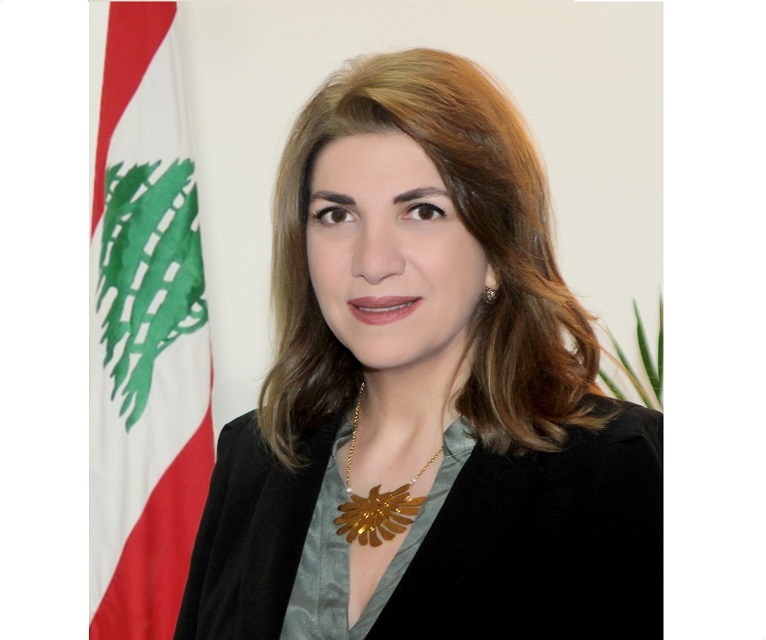
Marie-Claude Najm
Is Agrégée des facultés françaises de droit, Professor at the Faculty of Law and Political Science of Saint-Joseph University (Beirut), head of the “Department of Private Law” and Director of the “Centre of Legal Studies and Research for the Arab ...
Read MoreIs Agrégée des facultés françaises de droit, Professor at the Faculty of Law and Political Science of Saint-Joseph University (Beirut), head of the “Department of Private Law” and Director of the “Centre of Legal Studies and Research for the Arab World” (CEDROMA); she has served for many years as Visiting Professor at Panthéon-Assas University (Paris II) and Panthéon-Sorbonne University (Paris I). She is also a member of the Beirut Bar and works as a legal consultant. Born in Beirut on April 6th, 1971, Marie-Claude Najm holds law degrees from Panthéon-Assas University (Paris II) and Saint-Joseph University of Beirut as well as a Ph.D. in Private International Law from Panthéon-Assas University (Paris II). Her fields of research are conflict of laws and international jurisdiction, mainly in plural legal systems, and her publications include: Principes directeurs du droit international privé et conflit de civilisations. Relations entre systèmes laïques et systèmes religieux (Dalloz, Paris, 2005); « Lebanon- Country report on Private International Law », Basedow / Rühl / Ferrari / De Miguel (eds.), Encyclopedia of Private International Law, Edward Elgar (2016); “The Enforcement of Foreign Judgments in Lebanese Private International Law”, Yearbook of Private International Law, Vol. 17 (2015/2016), p.463; Filiation and the Protection of Parentless Children: Towards a Social Definition of the Family in Muslim Jurisdictions, N. Yassari, L.-M. Moller & M.-C. Najm Kobeh (eds.), T.M.C. Asser Press, The Hague, 2019. In addition to her work as a scholar and a practitioner, Marie-Claude Najm has contributed in numerous civil society projects. She was a founding and active member of "Khalass!" (i.e. "Enough!"), a civil society campaign launched in 2007 and seeking to develop a peaceful and binding solution to the political deadlock in Lebanon, and she has been recently engaged in the non-sectarian intifada of the Lebanese people, seeking a positive change in the political culture in Lebanon. As to her personal life, Marie-Claude Najm is married to Dr. Daniel Kobeh, with a daughter, Sarah-Marie, born in 2010.

Albert Aziz Serhan
...
Read MoreMinister of Justice Albert Aziz Serhan Personal information - place and date of birth: Btorram – Koura – North Lebanon – 18 january 1950. - Marital status: Married to Janane Chehadé and father of Alfred (Lawyer) and Alain (Ingineer). - Address: Adonis – Zouk Mosbeh – Kesserwan. Educational Background - High School degree in Philosophy 1968. - Diploma of Law – Public law – St Joseph University Beirut 1972. - Master in Law – Public in Law – St Joseph University Beirut 1975. Professional Career - Judge at the State Council 1977 – 2018. - Vice President of the National Social Security Council 2002 – 2004. - President of a Judicial Chamber at the State Council 2003 – 2018. - Honorary Judge Status with the rank of President of Chamber at the State Council under the decree 2309 dated 6/2/2018. Academic work and publications - Lecturer in Public Law at the Institute of Judicial Studies – Beirut till 2019. - Lecturer in Public Law at the Holy Spirit University – Kaslik till 2019. - Lecturer in Public Law at the Lebanese University till 2003. - Former Legal advisor of the Ministry of Energy and water – Oil Installations - Former Legal advisor of the Publlic Corporation for Housing. - Author of legal books in Public Law in Arabic and french: * Principle of Legality in Lebanese Administrative law – 1975. * Public Institutions – 1981. * International Law and Organizations (french). * Aministrative Special Law 2012.
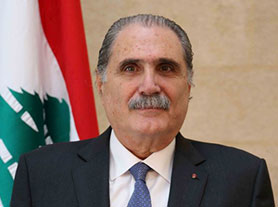
Salim Jean Jreissati
Salim Jean Jreissati was born in Zahle on April 4, 1952. He completed his secondary education at the Modern Lebanese Foundation (Father Michel Khalifa) al-Fanar. He studied law at Saint Joseph University in Beirut, where he graduated with degrees on ...
Read MoreSalim Jean Jreissati was born in Zahle on April 4, 1952. He completed his secondary education at the Modern Lebanese Foundation (Father Michel Khalifa) al-Fanar. He studied law at Saint Joseph University in Beirut, where he graduated with degrees on both French and Lebanese law. He also received a graduate degree in personal rights from the College of Law and Political Science at Saint Joseph University in Beirut. Since 1976, he has been a lecturer at the College of Law and Political Science at Saint Joseph University. From 1979 to 1984, he was a lecturer at the Center for Banking Studies, which is affiliated with the Association of Banks in Lebanon and Saint Joseph University, in the subjects of commercial support, banking operations, and civil law. From 1982 to 1984, he was a lecturer at the American University of Beirut in international business law. From 1982 to 1985, he was also a lecturer at the translation institute in Beirut (Saint Joseph University) in comparative criminal codes. He has been a member of the Beirut Bar Association since 1974. From early February 2010 to the end of March 2013, he was also a member of a Parliamentary body to update Lebanon’s laws. Since April 29, 2010, he has been a member of the Beirut Bar Association’s Legislative Committee. He is also a founding member of the Lebanese Arbitrators Association. From 1981 to 1997, he served as board member of the Center for Insurance Studies of the Association of Insurance Companies in Lebanon and Saint Joseph University. He was appointed a member of the Constitutional Council on August 25, 1997, a position he held until June 25, 2009. He was appointed as Minister of Labour in February 2012, succeeding Minister Charbel Nahas, in then President Najib Mikati’s cabinet. In December 2016 he was appointed as Minister of Justice in Prime Minister Saad Hariri’s cabinet. He is the author of numerous constitutional, legal, political, economic, and financial studies, lectures, and papers, in Arabic and French. He was awarded the National Order of the Cedar with a rank of Commander, and a golden Order of Merit. He is married to Ms Nada al-Husseini, and they have four children: Jean-Yves, Julien and Jennifer Mary.
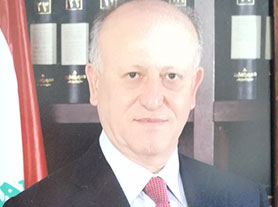
Ashraf Ahmed Rifi
Ashraf Ahmed Rifi was born in Tripoli on April 1, 1954. He completed his secondary education, and enrolled in the Lebanese military academy, where he graduated with a rank of lieutenant. He was promoted within the Directorate General of Internal ...
Read MoreAshraf Ahmed Rifi was born in Tripoli on April 1, 1954. He completed his secondary education, and enrolled in the Lebanese military academy, where he graduated with a rank of lieutenant. He was promoted within the Directorate General of Internal Security Forces to the rank of Major General. He was then appointed Director-General of the Internal Security Forces in 2005, a position he held until he retired in 2013. He studied criminal sociology at the Lebanese University. He also studied police practices during his missions abroad in Canada, France, and Saudi Arabia. He is a member of the High Council for Naif Arab University for Security Sciences. In February 2014 he was appointed Minister of Justice in then Prime Minister Tammam Salam’s cabinet, but he resigned on February 21, 2016. He is married to Ms Suleima Adeeb, and they have four children: Ahmed, Kareem, Amal, and Hanaa.
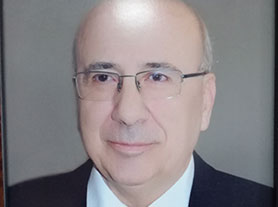
Shakib Wadih Qortbawi
Shakib Wadih Qortbawi is from Kafr Silwan (Baabda). He was born in Chtaura, in the Bekaa Valley on January 17, 1945. He completed his primary education at the St. Ephrem School in Zahle, and his supplementary and secondary education at ...
Read MoreShakib Wadih Qortbawi is from Kafr Silwan (Baabda). He was born in Chtaura, in the Bekaa Valley on January 17, 1945. He completed his primary education at the St. Ephrem School in Zahle, and his supplementary and secondary education at the Marist Brothers School in Jounieh. He received a degree in philosophy in 1963. He studied law at Saint Joseph University, and graduated in 1967. He worked in the office of Professor Shaheen Hatem from 1967 to 1970, and eventually opened his own office, and soon partnered with Ramzy Greg, President of the Beirut Bar Association. He was a member of the Beirut Bar Association for three years, and a member of the disciplinary council. He was also elected President between 1995 and 1997. He was a Board Member of the National Bloc Party for several years, but resigned in early November of 2002 when he joined the Qornet Shehwan Gathering. He ran in the parliamentary elections in 2009 (in the Baabda district), but withdrew. He was appointed Minister of Justice in June 2011, in then President Najib Mikati’s cabinet. He is married to Ms Arlette al-Qayyim, and they have three children: Nayla, Wadiya, and Wassim.
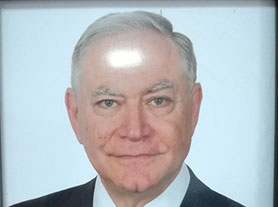
Ibrahim Albert Najjar
Ibrahim Albert Najjar was born in Tripoli in 1941. He completed his primary and supplementary education at the Antoura School, and his secondary education at the French Lycee in Beirut. He studied law at the Lebanese University, and received his ...
Read MoreIbrahim Albert Najjar was born in Tripoli in 1941. He completed his primary and supplementary education at the Antoura School, and his secondary education at the French Lycee in Beirut. He studied law at the Lebanese University, and received his Bachelor’s degree in 1963. He also received a French LL.B. in law in the same year, and a graduate diploma in legal studies in 1964. He received his doctorate from the University of Paris in 1966. His dissertation was considered one of the best dissertations submitted in France that year, and was published with the assistance of the National Council for International Research. He teaches at Saint Joseph University. Since 1969 he has been a professor at the College of Law and Political Science, where he also serves as Chairman of the Department of Public Law. Najjar also joined the Beirut Bar Association. He is a former lawyer with the Court of Appeals in Paris, a member of the High Council of Arbitration in Lebanon, and a member of several international associations related to private law. He is also a member of several committees to standardise the laws in Lebanon. He is a lawyer for the state of Lebanon in international arbitration, and relied on as an expert in jurisprudence by the Arab League. He is a professor at the Lebanese University, has a graduate degree in “Disputes and Arbitration,” and is a visiting professor at several law schools in France (Paris 1, Paris 2, Tolouse, and Nantes). He is also the head of the graduate department of banking and financial markets at the Jesuit University in Beirut. He has published many legal studies and papers, and has given many lectures in comparative law, international law, protecting intellectual property, and other subjects. He founded and chaired the Students’ Department in the Lebanese Phalanges Party from 1960 to 1966. In 1973 he was appointed as a member in the political office of the Phalanges Party. He was also a member of the Committee for Constitutional Reform that emerged from conferences in Geneva and Lausanne in 1985. He was appointed Minister of Justice in July 2008, in then Prime Minister Fouad Siniora’s cabinet. In November 2009, he was again appointed as Minister of Justice in the cabinet led by then Prime Minister Saad Hariri. He received the Medal of Honor from Saint Joseph University. He is married to Ms Mary Rose Chamoun, and they have three children: Natalie, Serge, and Cyril.
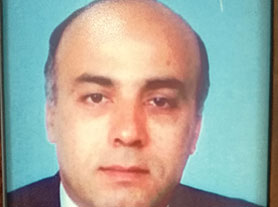
Khaled Mohieddine Kabbani
Khaled Mohieddine Kabbani was born in Beirut on 15 February 1945. He enrolled in primary and intermediate school at several schools, and then completed secondary school at the Tarik Jdideh School in 1964. He studied law at the Lebanese University, ...
Read MoreKhaled Mohieddine Kabbani was born in Beirut on 15 February 1945. He enrolled in primary and intermediate school at several schools, and then completed secondary school at the Tarik Jdideh School in 1964. He studied law at the Lebanese University, earning his degree in 1968. He completed his studies in public law and private law between 1969 and 1974, earning his doctorate in public law from the Lebanese University in 1979. He also earned a diploma in public administration from the National Institute of Management and Development. He has been the Director General of the Social Welfare Institutions in Lebanon – Islamic Orphanage since 2013. He was also a member of its board of trustees. In addition, he was the head of the administrative council for the Islamic Endowments of Beirut 1989 to 2005. He is a member of the Board of Trustees for the Al-Makassed Philanthropic Islamic Association, and head of its Education Committee. He is also a member of the Development Studies Association, a member of the Arab Group for Muslim-Christian Dialogue, and a member of the Foundation for Permanent Civil Peace He was head of the Cases Department in the Ministry of Justice from 1969-1970, and then worked as a diplomatic attaché in the Lebanese embassies in Kuwait and Bahrain from 1970-1974. He was a judge in the State Shura Council from 1975-1994, and a head of chamber in the State Shura Council from 2001-2005. He was also a member of the Constitutional Council from 1994-2000. He was an advisor to the Prime Ministers from 1980 until 1992, serving without interruption and by official commission. He was also an advisor to the speaker of parliament from 1984 to 1992, serving without interruption and by official commission. In addition, he was a member of several administrative, legal, and constitutional committees. He was also a member of the supreme advisory commission for the Lebanese University from 1980-2001, in addition to being a lecturer at several Lebanese universities. He was appointed Minister of Justice in April 2005 in Prime Minister Najib Mikati’s government. He was then appointed Minister of Education and Higher Education in July 2005 in Prime Minister Fouad Siniora’s government. Afterwards, he was appointed minister of state in July 2008 in Prime Minister Fouad Siniora’s government. He was then appointed head of the Civil Service Board in March 2010, and continued in this position until his retirement. He participated in the Doha conference that was held on 17 May 2008, with the support of the Emir of Qatar, in order to find a solution to the Lebanese crisis. He is married Ms to Nadia Kabbani. They have one child, Nour.
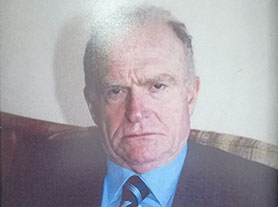
Charles Elias Rizk
Charles Elias Rizk was born in Beirut on July 20, 1935. He completed his education in several stages at the Jesuit Fathers’ School in Beirut. He travelled to France and studied law at the University of Paris, where he received ...
Read MoreCharles Elias Rizk was born in Beirut on July 20, 1935. He completed his education in several stages at the Jesuit Fathers’ School in Beirut. He travelled to France and studied law at the University of Paris, where he received his doctorate. He received a certificate in political science, and a Bachelor’s degree in literature from the University of Lyon in France. After returning to Beirut, he was appointed by President Fuad Chehab as Director of the Studies Institute at the Civil Service Council. In 1967 he was appointed Director-General of the Ministry of Information, and in 1970 he became an inspector in the Central Inspections Agency. In 1973 he became the Director-General of the National Association for the Litani River. In 1977 he returned to the General Directorate of the Ministry of Information. In 1978 he was appointed Chairman of the Board and General Manager of Télé Liban. In 1983 he went into the private sector. He founded two information technology companies, and founded branches of those companies in Ireland, and Bulgaria. In 1998, President Émile Lahoud appointed him as his personal representative on the Permanent Council of La Francophonie. In April 2005, he was appointed Minister of Information in Prime Minister Najib Mikati’s cabinet. He was then appointed as Minister of Justice in July 2005, under Prime Minister Fouad Siniora. During his term as Minister, he helped merge Télé Liban and the official Radio Liban, bringing them into the private sector. He also adopted the position that the Ministry of Justice should have a role in investigating the assassination of former Prime Minister Rafic Hariri, and created a special tribunal to try the two suspects charged with the assassination of Hariri and his companions. His intellectual contributions include: Between Islam and Arabism, and Arabs in History. He is married to Ms Reen Shaqir, and they have two children: Joanna and Karen.
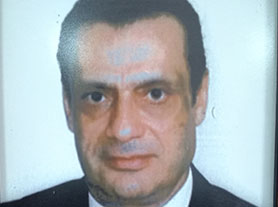
Adnan Mohammed Adoum
Adnan Mohammed Adoum was born in Beirut on 10 January 1941. He studied at the Al-Maaref Al-Ahlieh School in Beirut, and then at the International College, where he earned his Baccalaureate II in 1961. He then studied law in the ...
Read MoreAdnan Mohammed Adoum was born in Beirut on 10 January 1941. He studied at the Al-Maaref Al-Ahlieh School in Beirut, and then at the International College, where he earned his Baccalaureate II in 1961. He then studied law in the Lebanese University, earning his diploma in 1965. He entered the Institute for Judicial Studies, and graduated from it as a judge. He was then appointed a member of the Court of First Instance in Beirut, and then as a judge sitting singly in the North Matn court. He was then appointed as a public attorney in the South Governorate, and then head of the Court of First Instance in Beirut – Bankruptcy Chamber. Afterwards, he was appointed head of the Mount Lebanon Criminal Court, until he was appointed prosecuting attorney in the Court of Cassation in 1995. He also taught in the Institute for Judicial Studies, lecturing on the subjects of bankruptcy and banks. He represented Lebanon in several international conferences. He also participated in developing the International Criminal Court System (the Rome statute) in New York, and in the preparatory work for it that was done in Cairo. He was appointed Minister of Justice in October 2004 in Prime Minister Omar Karami’s government. He published several legal studies in law journals. He addressed the Judicial Council several times, the most prominent of which was his address to the Judicial Council regarding the assassination of Prime Minister Rashid Karami. He is married to Roula Jumaa. Their children are Nada and Mohammad.
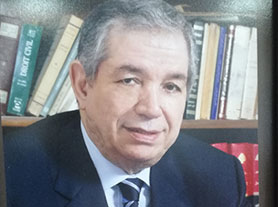
Samir Adnan Al Jisr
Samir Adnan Al Jisr was born in Tripoli on 10 June 1944. He completed primary and middle school at the College des Freres in Tripoli, and then completed secondary school at the College des Freres boarding school in Jounieh. He ...
Read MoreSamir Adnan Al Jisr was born in Tripoli on 10 June 1944. He completed primary and middle school at the College des Freres in Tripoli, and then completed secondary school at the College des Freres boarding school in Jounieh. He studied law at the Beirut Arab University, earning his degree in 1969. He joined the Bar Association in 1969, and became a lawyer in the Court of Appeals in 1972. He was elected as a member of the Bar Association Council in Tripoli in 1991. He took on the responsibilities of treasurer for two years, and then became secretary-general. He was also elected president of the Bar Association in Tripoli. He considered social work to be very important, especially as he was elected the first president of the Social Movement in Tripoli. He was elected as a member of the Makarem Association for Islamic Morals, and then elected vice president of the association. He was also elected head of the Council of Delegates of the National Gathering for Social Action in 1999. He joined the Future Movement, and was its general coordinator in the North Governorate until 2008. He was appointed Minister of Justice in October 2000 in Prime Minister Rafic Hariri’s government. He was then appointed Minister of Education and Higher Education in April 2003 in Prime Minister Rafic Hariri’s government. He was elected as a Member of Parliament from the North Governorate, Tripoli District, in 2005 and 2009. He is still a Member of Parliament according to the laws passed in 2013 and 2014 to extend the parliament’s mandate. He was elected a member of the Administration and Justice Committee and of the Supreme Council for the Trial of Presidents and Ministers. He was also elected head of the National Defense, Security, the Interior, and Municipalities Committee. He is a member of the Future Movement parliamentary bloc that is led by Prime Minister Saad Hariri. He is married Ms to Salam Abdul Latif Kabbara. Their children are Adnan, Ghassan, and Rami.
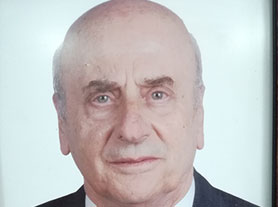
Joseph Elias Chaoul
Joseph Elias Chaoul was born in Deir Al-Qamar (Chouf District) on 25 July 1933. He studied at the Jesuit Saint Joseph School, which would later become the College Notre-Dame de Jamhour. He studied law at Saint Joseph University in Beirut, ...
Read MoreJoseph Elias Chaoul was born in Deir Al-Qamar (Chouf District) on 25 July 1933. He studied at the Jesuit Saint Joseph School, which would later become the College Notre-Dame de Jamhour. He studied law at Saint Joseph University in Beirut, and earned a degree in both a French and a Lebanese law. He also earned a degree in political science, and a doctorate in public law. In 1961, he was appointed as an associate counsellor in the judiciary. He was then promoted to become a counsellor, and then head of chambers. In 1990, he was appointed head of the State Shura Council. He dedicated his life to the judiciary and to university education. He wrote a number of legal studies, especially on administrative and tax law, on constitutional law, and on international public law. He was appointed Minister of Justice in December 1998 in Prime Minister Selim Hoss’s government. He is married Ms to Josephine Jallad. Their children are Elias, Henri, and Nada.
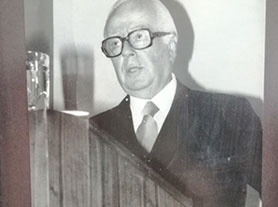
Nasri Suleiman Maalouf
Nasri Suleiman Maalouf was born in Ain El-Kabou (North Matn District) in 1911. He visited the primary school at St. John’s School, and then moved to the Patriarchate School, then the College des Freres in Beirut, where he completed secondary ...
Read MoreNasri Suleiman Maalouf was born in Ain El-Kabou (North Matn District) in 1911. He visited the primary school at St. John’s School, and then moved to the Patriarchate School, then the College des Freres in Beirut, where he completed secondary school. He then moved to Damascus, where he studied law in Damascus University. He graduated, and then began working as a lawyer in the office of Youssef Germanos. He was elected as a Member of Parliament from the Beirut I district in 1968, and again in 1972. He remained a Member of Parliament until 1992, according to the laws extending the parliament’s mandate. He was also elected to parliament in the special elections that were held in 1995 to fill the seat left vacant by the death of Joseph Moghaizel. During his time in parliament, he participated in several parliamentary committees, including the Administration and Justice Committee, the Finance and Budget Committee, and the Foreign Affairs Committee. He was also Head of the National Defense Committee. In November 1956, he was appointed Minister of Finance, Minister of the Economy, and Minister of Labor and Social Affairs in Prime Minister Sami El Solh’s government. He was then appointed Minister of the National Economy and Minister of Labor and Social Affairs in October 1968 in Prime Minister Abdallah El Yafi’s government, but the government did not appear before the parliament, and submitted its resignation after one week. Afterwards, he was appointed Minister of Tourism in January 1969 in Prime Minister Rashid Karami’s government. However, he resigned from the position after one week, and was succeeded in the ministry by Habib Kairouz. Then, he was appointed Minister of National Defense in July 1973 in Prime Minister Takieddine El Solh’s government. He was also appointed Minister of Justice in May 1992 in Prime Minister Rachid Solh’s government. He was known for his speeches, particularly those that he gave in the criminal courts and in the parliament. He was one of the first thinkers who proposed the principles of the National Pact of 1937, along with Youssef El Sawda, Takieddine El Solh, Salim Idris, and Najib Al-Sayegh. He married Ms Widdad Al-Ghussein. He passed away in the United Arab Emirates on 2 April 2005.
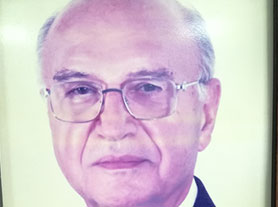
Bahij Bahij Tabbara
Bahij Bahij Tabbara was born in Beirut in 1929. He completed primary and secondary school at the International College. Afterwards, he began studying law at Saint Joseph University in Beirut, and then completed his law studies in Paris at the ...
Read MoreBahij Bahij Tabbara was born in Beirut in 1929. He completed primary and secondary school at the International College. Afterwards, he began studying law at Saint Joseph University in Beirut, and then completed his law studies in Paris at the Sorbonne. He continued his higher education in Grenoble, earning his doctorate in 1954. He joined the Bar Association in Beirut, and began working in the office of Fouad Boutros. He also worked as a university lecturer at Saint Joseph University and the Lebanese University. He was also the Vice President of the Social Welfare Institutions – Islamic Orphanage. Along with others, he published the magazine al-Mustaqbal in 1974. He also helped to establish the One Lebanon for Change Front in 1977. He was appointed Minister of Economy and Trade in April 1973 in Prime Minister Amin Al-Hafiz’s government, but the government did not appear before the parliament, and submitted its resignation in June of the same year. In October 1992, he was appointed Minister of Justice in Prime Minister Rafic Hariri’s government, and tasked with carrying out administrative reform. Afterwards, he was appointed Minister of Justice in October 1996 in Prime Minister Rafic Hariri’s government. Then, he was appointed Minister of State in October 2000 in Prime Minister Rafic Hariri’s government. Finally, he was appointed Minister of Justice in April 2003 in Prime Minister Rafic Hariri’s government. He was elected as a Member of Parliament from the Beirut II district in 2005. He wrote a number of political and legal articles, and gave several lectures in the Lebanese Cenacle and the Bar Association. He was close to Prime Minister Rafic Hariri. After the Prime Minister was assassinated, Tabbara worked to create a committee to follow the investigation into the crime of his assassination. He is married Ms to Hoda Kyriakos. Their children are Nadim, Rola, and Karim.
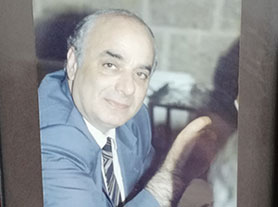
Edmond Amin Rizk
Edmond Amin Rizk was born in June 1934. He studied primary and middle school at Our Lady of Mashmousheh in Jezzine, and then entered secondary school in Al-Hikma school in Beirut. He received his secondary school diploma in 1949. He ...
Read MoreEdmond Amin Rizk was born in June 1934. He studied primary and middle school at Our Lady of Mashmousheh in Jezzine, and then entered secondary school in Al-Hikma school in Beirut. He received his secondary school diploma in 1949. He then studied law in Saint Joseph University, and in the Lebanese Academy of Fine Arts. He began working as an attorney in 1958, after he was hired in the office of Chafic Nassif, a Member of Parliament from Beirut. He also taught as a profession, teaching Arabic Language and Literature from 1951-1958 in the Al-Hikma schools, the Lebanese Institute, the Antonine Institute, and the Al-Ahlieh School for Girls. He also worked in journalism from 1951-1968, writing for the following newspapers: Al-Ruwwad, Nida’ al-Watan, al-Siyasa, al-Anwar, and al-Amal. He also provided political commentary on Radio Lebanon (1958-1968) and Lebanon Television (1966-1968). In addition, he edited opinion pieces and articles in Annahar, Assafir, al-Bairaq, al-Amal, al-Jarida, al-Hawadith, al-Masira, and other publications. He was elected as a Member of Parliament from the South Governorate, Jezzine District in 1968. He was reelected in 1972 and remained a Member of Parliament until 1992 according to the laws extending the parliament’s term. He participated in the work of the parliamentary councils. He was a member of the Administration and Justice Committee, the Appeals Committee, and the Rules of Procedure Committee. He was also rapporteur of the Foreign Affairs Committee, and a member of the parliamentary committee for investigating the Crotale missiles. He was appointed Minister of National Education and Fine Arts in April 1973 in Prime Minister Amin Al-Hafiz’s government, but the government did not appear before the parliament, and submitted its resignation in June 1973. He was then appointed Minister of National Education and Fine Arts in July 1973 in Prime Minister Takieddine El Solh’s government. Afterwards, he was appointed Minister of Justice and Minister of Information in November 1989 in Prime Minister Selim Hoss’s government. He represented Lebanon at several conferences and international events, including in Versailles in 1968, Cairo in 1970, Montreal in 1971, Dakar in 1972, and others. During his time as Minister of Education, he worked to establish applied colleges in the Lebanese University, and to double the number of public high schools. He also worked to establish training for teachers, to revive the High Technical Institute, and to make the slogan “A Chair for Every Student” a reality. He participated in the Taif conference in 1989, and in 1990, at the request of the Cabinet, he drafted a plan to amend the constitution. In 2001, he participated in establishing the Pact and the Constitution Meeting. He wrote a number of books, publications, and articles in several literary, political, legal, and historical journals. He is married Ms to Renee Christodolo. Their children are Amin, Bahjat, Nadim, Naji, Fadi, and Joumana.
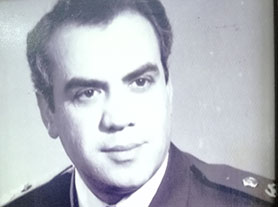
Loutfi Haidar Jaber
Loutfi Haidar Jaber’s family is from Mayfadoum in the south, and he was born in Beirut on 13 September 1939. He studied at the World College in Beirut and he received his Baccalaureate in 1958. He joined the military school in ...
Read MoreLoutfi Haidar Jaber’s family is from Mayfadoum in the south, and he was born in Beirut on 13 September 1939. He studied at the World College in Beirut and he received his Baccalaureate in 1958. He joined the military school in 1958, graduating as an officer at the rank of lieutenant in 1961. He served in several of the combat divisions, until he reached the rank of major general. He continued his higher education in the University of Brussels, earning his degree in scientific management in 1973. He was appointed brigadier-general in the Lebanese military in 1982. He was also appointed a member of the Military Council in the Ministry of Defense in 1985. He took over responsibility for the General Directorate of Administration in that same year. He was appointed Minister of Water and Electrical Resources, Minister of Agriculture, and Minister of Justice in September 1988 in Prime Minister General Michel Aoun’s government. However, he declined to serve in the government as soon as the government composition was announced. In this decision, he was joined by Major General Mahmoud Abou Dargham and Brigadier-General Nabil Koraytem. He was the head of the sixth brigade during the uprising on 6 February 1985. He is married Ms to Salwa Jaber. Their children are Haider, Bassam, and Mohammad.
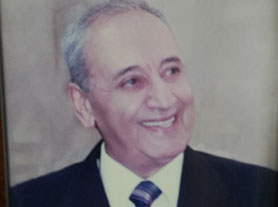
Nabih Berri
Nabih Berri’s family is from the southern town of Tebnine. He was born in Sierra Leone on 28 January 1938. After his return to Lebanon, he visited the primary school in Tebnine, and intermediate school in Bint Jbeil school and ...
Read MoreNabih Berri’s family is from the southern town of Tebnine. He was born in Sierra Leone on 28 January 1938. After his return to Lebanon, he visited the primary school in Tebnine, and intermediate school in Bint Jbeil school and the Geography College in Tyre. For secondary school, he attended Al-Makassed College and Al-Hikma school in Beirut. He then entered the Lebanese University, and he earned his law degree at the top of his class. He continued his studies in law at the Sorbonne University in France. He joined the Bar Association in Beirut, and began working in the office of Abdallah Lahoud. From his youth, he fought in the students’ movement. He was the head of the National Union of University Students in Lebanon. He also participated in a number of student and political conferences, and worked alongside Imam Musa Al-Sadr in the Movement of the Dispossessed, where he took on many responsibilities. In 1980, he was elected leader of the Lebanese Resistance Regiments, or “Amal,” and remains the group’s leader today. In April 1984, he was appointed Minister of State for the South and Reconstruction, Minister of Water and Electrical Resources, and Minister of Justice in Prime Minister Rashid Karami’s government. Then, he was appointed Minister of Water and Electrical Resources and Minister of Housing and Cooperatives in November 1989 in Prime Minister Salim Hoss’s government. He was also appointed minister of state twice, the first time in December 1990 in Prime Minister Omar Karami’s government, and the second time in May 1992 in Prime Minister Rachid Solh’s government. He was appointed as a Member of Parliament from the South Governorate in 1991. Then he was again elected as a Member of Parliament, in addition to being head of the South parliamentary list, in the elections of 1992, 1996, 2000, 2005, and 2009. He is still a Member of Parliament today according to the laws passed in 2013 and 2014 to extend the parliament’s mandate. He was elected deputy speaker of parliament for the first time on 20 October 1992, and was reelected deputy speaker in 1996, 2000, 2005, and 2009. From 1993 until today, he has been the head of Union of Parliamentarians of Lebanese Descent, which includes members from 19 different countries. In 2003, he was elected head of the Arab Inter-Parliamentary Union, and was reelected to this position in 2014. He was also elected president of the Parliamentary Union of the OIC Member States in 2004. He called for a national dialogue conference in the parliament in 2006 and 2015. He also participated in the national dialogue conference that was held, with the support of the Emir of Qatar, in Doha on 17 May 2008. He is married Ms and his children are Moustafa, Abdallah, Bassil, Silan, Sawsan, Farah, Hind, Amal, and Maysaa.
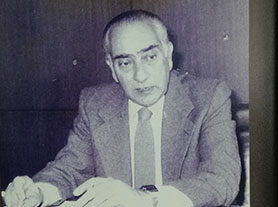
Roger Nicolas Shikhani
Roger Nicolas Shikhani was born in Bikfaya (Matn District) on 25 October 1923. He studied at the Pères Jésuites school in Beirut, and then studied in law at the Jesuit University. He earned his degree in 1945. He began working ...
Read MoreRoger Nicolas Shikhani was born in Bikfaya (Matn District) on 25 October 1923. He studied at the Pères Jésuites school in Beirut, and then studied in law at the Jesuit University. He earned his degree in 1945. He began working as a lawyer in the office of Wadie El Dawid. He was elected member of the Bar Association Council for a period of eight years. He was also elected president of the Bar Association from 1974 to 1977. His term was extended until 1981 according to a legislative decree. He was elected as a member of the board of directors of the Intercontinental Bank. In addition, he was a legal advisor for the Fransabank bank. He was appointed Minister of Justice and Minister of Information in October 1982 in Prime Minister Shafik Wazzan’s government. He married Ms Ebla Karkabi. Their children are Claude and Daniel. He passed away on 27 October 1991. He was granted the National Order of the Cedar at the rank of Grand Officer posthumously.
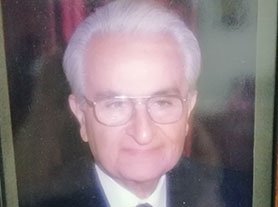
Khatchig Diran Babikian
Khatchig Diran Babikian was born in the Cypriot city of Larnaca in 1922. He attended primary and secondary school in Beirut at the Italian school. He earned his degree in law from the Jesuit University, then a graduate certificate in ...
Read MoreKhatchig Diran Babikian was born in the Cypriot city of Larnaca in 1922. He attended primary and secondary school in Beirut at the Italian school. He earned his degree in law from the Jesuit University, then a graduate certificate in economics and a graduate certificate in international law. He was proficient in seven foreign languages, particularly Arabic and French. He began practicing law as an attorney in 1944, working in the office of the president of the Bar Association Dabis Murr. He was elected as a Member of Parliament from the Beirut I district in 1957, and was reelected in 1960, 1964, 1968, and 1972. He was then elected as a Member of Parliament from the Beirut Governorate in 1992 and 1996. He won by acclamation in most of these elections. He participated in most of the parliamentary committees, and headed several of them. Likewise, he was Head of the Lebanese delegation at the Francophonie Parliamentary Assembly. He was also elected member of the Supreme Council for the Trial of Presidents and Ministers. He was appointed Minister of Administrative Reform in August 1960 in Prime Minister Saeb Salam’s government. In January 1969, he was appointed Minister of Public Health in Prime Minister Rashid Karami’s government. Likewise, he was appointed Minister of Information in June 1972 in Prime Minister Saeb Salam’s government after the cabinet reshuffle that occurred on 3 June 1972. He was then appointed Minister of Public Planning and Transportation in April 1973 in Prime Minister Amin Al-Hafiz’s government, which did not appear before the parliament. Afterwards, in October 1980, he was appointed Minister of Justice in Prime Minister Shafik Wazzan’s government. He was also appointed Minister of Justice in December 1990 in Prime Minister Omar Karami’s government. He was the Head of the Armenian Association for Housing and the Rotary, as well as the Central Committee of Armenian Catholics in Antelias and the Armenian Business Association. He remained in the latter two organizations until his death. He represented the president of the republic in the High Council for Francophone Countries. He was also vice president of the Parliamentary Assembly of La Francophonie from 1960 until his death. He held and participated in many lectures and symposiums on politics, economics, and sociology. Upon his death, he gifted his library to the Armenian patriarchate. He received several Lebanese and foreign honors. He was a member of the Tashnag Party and of the Armenian Representatives’ bloc. He married Ms Marguerite Hajjar. Their children are Renee Marie, Christine, Anita, Carole, and Nicole. He passed away in 1999.
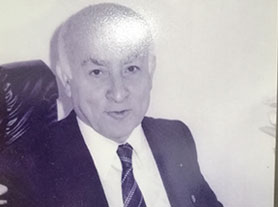
Youssef Najm Gebran
Youssef Najm Gebran was born in Mazraat Al-Methane (Jezzine District) on 29 June 1921. He completed his primary education in a small village school, and then entered middle school at the Marists’ school in Sidon. He completed secondary school at ...
Read MoreYoussef Najm Gebran was born in Mazraat Al-Methane (Jezzine District) on 29 June 1921. He completed his primary education in a small village school, and then entered middle school at the Marists’ school in Sidon. He completed secondary school at the Congregation of the Mission school in Damascus. He then studied law at Saint Joseph University in Beirut, where he earned his degree in 1945. He also earned a diploma in Eastern literature from the same university. He joined the Bar Association in 1945, and began working at the office of Louis Eid. He practiced law until 1953, when he was appointed as a judge sitting singly in Batroun. Then, he was moved to Beirut as a judge for urgent members, then as Head of the Implementation Department. Afterwards, he was appointed Head of the Court of First Instance. He became the presiding judge in the Northern Lebanon Court of Appeals in 1966. In the following year, he became the presiding judge in the Beirut Court of Appeals. He remained head of this court until 1978. During this time, he also took over as head of the Court of Publications. He was also appointed the presiding judge in the Court of Cassation, and Head of the Supreme Judicial Council. He also taught law at the Lebanese University and Saint Joseph University. He was appointed Minister of Justice and Minister of Information in July 1979 in Prime Minister Salim Hoss’s government. He retained his original post throughout his tenure as a Minister. During his time in the Ministry, he organized a contest to choose notaries, and contributed to the passage of a law that granted loans for lawyers who were negatively impacted by the security situation. Youssef Gebran was the first judge to apply provisions of the Bill of Human Rights related to freedom of thought and belief in his rulings. He also issued a historical ruling that removed the mention of religion from national identity cards. In his youth, he was a member of the Kataeb (Phalanges) Party for a few months. Afterwards, he did not join any party or political organization. He exercised his convictions through his writings and his defense of public freedoms and human rights, especially freedom of the press. He was the Head of the Lebanese Association of Children’s Villages from 1969 until his death. He wrote a number of publications, the most prominent of which are Tort Liability; The Individual, Right, and Freedom; and Methods of Precaution and Implementation, and gave several lectures, due to his participation in scientific lectures both in and outside Lebanon. He married Ms Jeanne El Helou. Their children are Fadi, Joumana, Naji, and Charmine. He passed away on 4 December 1999.
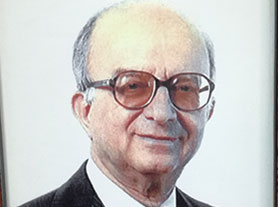
Farid Elias Raphael
Farid Elias Raphael was born in the town of Dlebta (Keserwan District) on 28 October 1933. He studied at the Pères Jésuites School in Beirut, and then entered the law institute of Saint Joseph University, where he earned his degree ...
Read MoreFarid Elias Raphael was born in the town of Dlebta (Keserwan District) on 28 October 1933. He studied at the Pères Jésuites School in Beirut, and then entered the law institute of Saint Joseph University, where he earned his degree in French law in 1954, and his degree in Lebanese law in 1955. He also earned a degree in banking science. He began his professional life in 1956, when he began work in the Algerian Company for Credit and Exchange. In 1967, he founded the Banque Libano-Francaise, and then became its general director. He was also the Head of the bank’s Board of Directors, and its General Director, in 1979. He was appointed Minister of Justice, Minister of Finance, and Minister of Post, Telegraph, and Telephone in December 1976 in Prime Minister Salim Hoss’s government. He was elected President of the Association of Banks in Lebanon from 1998-2001. He received the French Legion of Honor at the rank of Chevalier and Officer. He married Ms Ilham Abdulahid. Their children are Walid, Raya, Zeina, and Evelyn. He passed away on 1 September 2014.
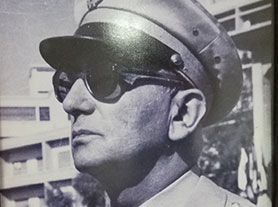
Nourredine Abdullah Al Rifai
Noureddine Abdullah Rifai was born in Albania, located on the Adriatic Sea, in 1899. His father worked as a customs director in the Albanian vilayet, which fell under the authority of the Ottoman Empire. In 1910, his family left for ...
Read MoreNoureddine Abdullah Rifai was born in Albania, located on the Adriatic Sea, in 1899. His father worked as a customs director in the Albanian vilayet, which fell under the authority of the Ottoman Empire. In 1910, his family left for Astana, then Beirut. He completed his early studies in both Astana and Beirut. He joined the Ottoman Army in 1916. After the war, he was dismissed from the military and returned to Lebanon. In the beginning of the Mandate period, he entered the gendarmerie at the rank of first lieutenant. Then, he moved up the ranks and held several different positions, including head of the gendarmerie school in 1928, and director of the police in 1937. In 1943, he was appointed head of the third legion. In 1947, he was appointed Governor of the North Governorate, and then General Director of the internal security forces in 1959, where he remained until he retired in 1962. In May 1975, President Suleiman Frangieh appointed him Prime Minister, Minister of Justice, Minister of Public Health, and Minister of Industry and Petrol, following the bloody events that began in April 1975. However, his military government did not present its ministerial statement to the parliament, and resigned at the end of June 1975. Noureddine Rifai was known for his discipline, and his concern for the law and for equality. He received a number of honors, most of which were war medals. They include the National Order of the Cedar at the level of Commander and the Palm War Medal. He married Ms Hikmat Arsouzi. They had two daughters. His daughter Ilham, was his only heir. His second daughter lived with her mother in Turkey after she left Lebanon. He passed away in January 1980.
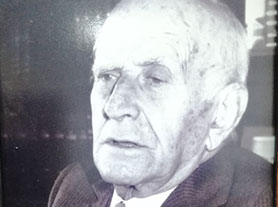
Kazem Ismail Al Khalil
Kazem Ismail Al Khalil was born in Tyre in 1902. He completed primary school at the College des Freres in Sidon, then secondary school at the American University in Beirut. He then studied law and received his diploma from the ...
Read MoreKazem Ismail Al Khalil was born in Tyre in 1902. He completed primary school at the College des Freres in Sidon, then secondary school at the American University in Beirut. He then studied law and received his diploma from the Law Institute in Damascus. He began practicing law in 1931. Then, he was appointed as a judge in Tripoli and Damour from 1933-1936. He was elected as a Member of Parliament from the South Governorate in 1937, and was reelected in 1943, 1947, 1953, and 1957 as a Member of Parliament from Tyre. He was also elected as a Member of Parliament from the South Governorate, Tyre District, and remained a Member of Parliament until his death, according to the laws extending the parliament’s mandate. He was elected as a member of the following committees: Finance, Administration and Justice, National Education and Fine Arts, National Economy, Agriculture, and Tourism. He was appointed Minister of Agriculture and Minister of Health and Public Relief twice in Prime Minister Abdallah El Yafi’s government, the first time in August 1953 and the second time in March 1954. He was also appointed Minister of Post, Telegraph, and Telephone and Minister of Social Affairs in September 1955 in Prime Minister Rashid Karami’s government. He was then appointed Minister of Agriculture, Minister of the National Economy, and Minister of Public Planning in August 1957 in Prime Minister Sami El Solh’s government. He was also appointed Minster of the National Economy in March 1958 in Prime Minister Sami El Solh’s government. In May 1958, he was appointed Minister of Post and Telegraph, succeeding Bashir Al-Othman after his resignation. Afterwards, he was appointed Minister of Social Affairs in May 1972 in Prime Minister Saeb Salam’s government. He was then appointed Minister of Justice in April 1973 in Prime Minister Amin Al-Hafiz’s government, but the government did not appear before the parliament. Finally, he was appointed Minister of Justice in July 1973 in Prime Minister Takieddine El Solh’s government. He was elected Deputy Speaker of the parliament in 1946. He carried out a number of development and human service projects, including building schools and hospitals in the Tyre region. He also participated in establishing the Supreme Shiite Islamic Council. He received a number of honors, included the Grand Cordon, which he was awarded posthumously. He married Ms Mazine Haider. Their children are Maha, Khalil, Nasser, Mira, and Abdulkarim. He passed away in Paris on 22 April 1990.
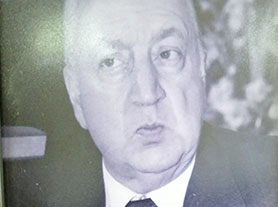
Jamil Rashid Kebbi
Jamil Rashid Kebbi was born in Beirut on 23 September 1930. He completed primary, middle, and secondary school at the Al-Makassed Islamic College, finishing his studies in 1949. He then traveled to Cairo and studied law at Cairo University, graduating ...
Read MoreJamil Rashid Kebbi was born in Beirut on 23 September 1930. He completed primary, middle, and secondary school at the Al-Makassed Islamic College, finishing his studies in 1949. He then traveled to Cairo and studied law at Cairo University, graduating in 1953. He received his doctoral degree in economics from the same university in 1955. He worked as an attorney from 1959-1961, and taught economics in the Beirut Arab University from 1960-198. He was the head of the Al-Makassed Alumni Association from 1959-1961, and the secretary-general of the Beirut Arab University from 1961-1984. He was elected as a Member of Parliament from the Beirut III district in 1927, and remained a Member of Parliament until 1992 according to the laws extending the parliament’s mandate. He participated in the work of the parliamentary committees, and was a member of the following committees: Administration and Justice; the Post, Telegraph, and Telephone; Labor and Social Affairs; National Education, and the National Economy. He was also the rapporteur of several committees, in addition to being the head of the Post, Telegraph, and Telephone Committee. He was appointed Minister of Justice and Minister of Post, Telegraph, and Telephone in October 1970 in Prime Minister Saeb Salam’s government. Likewise, in May 1972, he was appointed Minister of Post, Telegraph, and Telephone in Prime Minister Saeb Salam’s government. He was also appointed Minister of Health and Minister of Social Affairs in December 1990 in Prime Minister Omar Karami’s government. During his time in the ministry, he participated in creating the foundations for the Beirut public hospital. He also approved the decision that the Ministry of Health would cover 90% of the costs of dialysis and open-heart surgery. He wrote a number of economic, political, and religious studies. He was a member of the Arab Nationalist Movement, but withdrew from it in 1963. He participated in the conferences of Geneva, Lausanne, and Taif. He was a member of Prime Minister Saeb Salam’s parliamentary bloc. He married Ms Anbara Sinno. Their children are Jamal, Ehab, and Omar. He passed away on 14 February 1998.
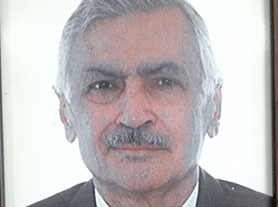
Shafik Dib Wazzan
Shafik Dib Wazzan was born in Al-Basta Al-Tahta (Beirut) in 1925. He completed his education through secondary school at the Al-Makassed Philanthropic Islamic schools. He then entered the Jesuit University, graduating in 1947 with his degree. Afterwards, he began working ...
Read MoreShafik Dib Wazzan was born in Al-Basta Al-Tahta (Beirut) in 1925. He completed his education through secondary school at the Al-Makassed Philanthropic Islamic schools. He then entered the Jesuit University, graduating in 1947 with his degree. Afterwards, he began working as an attorney. He worked in a number of fields, and was the head of the Islamic Council and a member of the National Commission. He was elected as a Member of Parliament from the Beirut III district in 1968, and was a member of the Administration and Justice Committee. He was appointed Minister of Justice in January 1969 in Prime Minister Rashid Karami’s government. He was appointed Prime Minister and Minister of Interior twice, first in October 1980 and then in October 1982. He was Prime Minister during the period of the Israeli invasion of Lebanon in June 1982. During his time in office, the May 17 agreement was signed. He participated in founding the National Commission Party. He married Ms Wajiha Idris Wazzan. Their children are Wassim and Sawsan. He passed away on 9 July 1999.
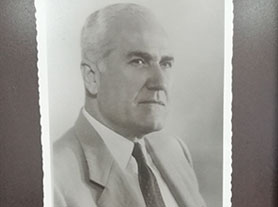
Adel Abdallah Osseiran
Adel Abdallah Osseiran was born in Sidon in 1905. He studied at the College des Freres, and then at the International College in 1924. He received his Bachelors of Arts in 1928 and his Masters of Arts in 1929. He ...
Read MoreAdel Abdallah Osseiran was born in Sidon in 1905. He studied at the College des Freres, and then at the International College in 1924. He received his Bachelors of Arts in 1928 and his Masters of Arts in 1929. He graduated as a professor in political science. He was elected as a Member of Parliament from the South Governorate in 1943, 1947, 1953, 1960, 1968, and 1972. He remained a Member of Parliament until 1992 due to the laws extending the parliament’s mandate. He was elected speaker of the parliament in 1952, and remained in that office until 15 October 1959. During this period, he was reelected seven times. In 1978 and 1990, he headed the sessions for the election of the speaker because he was the oldest Member of Parliament. He was appointed Minister of the National Economy in September 1943 in Prime Minister Riad El Solh’s government. In January 1969, he was appointed Minister of Interior in Prime Minister Rashid Karami’s government. Afterwards, he was appointed Minister of Justice in November 1969 in Prime Minister Rashid Karami’s government. He was also appointed Minister of Justice in October 1974 in Prime Minister Rachid Solh’s government. Afterwards, he was appointed Minister of Justice, Minister of Public Works, and Minister of Economics and Trade in July 1975 in Prime Minister Rashid Karami’s government. Finally, he was appointed Minister of National Defense and Minister of Agriculture in April 1984 in Prime Minister Rashid Karami’s government. Adel Osseiran opposed the policy of the French Mandate generally. In 1928, he demanded that the tax on agricultural lands be abolished, and that the Mandate’s restrictions be eased. He was arrested in 1936, and acted as his own defense before the French court. He established the Arab Youth Party in 1936, and participated in the Coast Conference, which was held that same year, before withdrawing from it. He drafted the first detailed electoral platform in 1937, and worked diligently to declare Lebanese independence in 1943. He received many Lebanese, Arab, and foreign honors. He married Ms Souad Ismail Al-Khalil. Their children are Zahra, Afaf, Samia, Abdallah, Ali (a Member of Parliament), Zeina, and Leila. He passed away on 18 June 1998. He was the last of the men of the independence period to pass away.
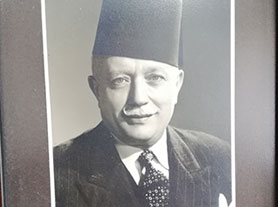
Rashid Baydoun
Rashid Baydoun was born in Beirut in 1889. He attended primary school in Beirut’s schools, and then attended secondary school at the Abbas Al-Azhari School, and in the American School in Sidon. At the start of his professional life, he worked ...
Read MoreRashid Baydoun was born in Beirut in 1889. He attended primary school in Beirut’s schools, and then attended secondary school at the Abbas Al-Azhari School, and in the American School in Sidon. At the start of his professional life, he worked in trade with his father. Then, he worked as a teacher at the Al-Najah school. In 1937, he traveled to Africa and . When he returned to Lebanon, he bought land in Beirut, and built the World College. He remained President of the college his entire life. In 1942, he founded the Vanguard organization, which announced its commitment to an independent Lebanon, and asked for Arab support. In 1943, he was one of the Members of Parliament that participated in amending the constitution. He was also one of the seven Members of Parliament who designed the Lebanese flag after they were detained in the parliament on the morning of 11 November. In 1937, he was elected as a Member of Parliament from the South Governorate for the first time. He was reelected in 1943. Then, he was elected as a Member of Parliament from Beirut in 1947, 1951, 1957, and 1964. During his time in parliament, he participated in the work of several parliamentary committees, including the Finance and Budget Committee, the Public Health Committee, and the National Defense Committee. He was also elected Head of the National Education Committee more than once, in addition to being elected Head of the Defense Committee. He was appointed Minister of National Defense in June 1951 in Prime Minister Abdallah El Yafi’s government. Then, in April 1953, he was appointed Minister of Post, Telegraph, and Telephone and Minister of Health and Public Relief in Prime Minister Saeb Salam’s government. He was then appointed Minister of National Defense in March 1958 in Prime Minister Sami El Solh’s government, but he soon resigned due to the events of 1958. Afterwards, he was appointed Minister of Justice and Minister of Post, Telegraph, and Telephone in February 1968 in Prime Minister Abdallah El Yafi’s government but he resigned from the Ministry of Post, Telegraph, and Telephone in April to become Minister of Tourism, while also remaining Minster of Justice. He then resigned from the Ministry of Justice in June to be appointed Minister of Tourism and Minister of National Defense. He received a number of awards, including the Lebanese Gold Medal of Merit, the Education Medal – First Class, the National Struggle Medal, the National Order of the Cedar at the rank of Officer, and the Tunisian Order of Glory at the rank of Commander. He married Ms Nazmiya Al-Shamaa. He passed away on 17 September 1971.
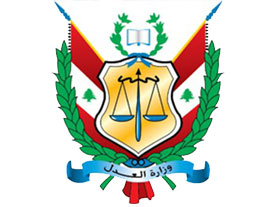
Suleiman Kabalan Frangieh
Suleiman Kabalan Frangieh was born in Ehden on 15 June 1910. He began his primary education at the College des Freres in Tripoli, and then continued his education at the Antoura School in 1924. He was elected as a Member of ...
Read MoreSuleiman Kabalan Frangieh was born in Ehden on 15 June 1910. He began his primary education at the College des Freres in Tripoli, and then continued his education at the Antoura School in 1924. He was elected as a Member of Parliament from the Zgharta District in 1960, and was reelected in 1964 and 1968. He was a member of the parliamentary committees. He was appointed Minister of Post, Telegraph, and Telephone in August 1960 in Prime Minister Saeb Salam’s government. He was appointed Minister of Post, Telegraph, and Telegraph and Minister of Agriculture in May 1961 in Prime Minister Saeb Salam’s government. He was appointed Minister of Interior in February 1968 in Prime Minister Abdallah El Yafi’s government. In October 1968, he was appointed Minister of Public Works and Transportation and Minister of Public Education in Prime Minister Abdallah El Yafi’s government. He was appointed Minister of the National Economy in November 1969 in Prime Minister Rashid Karami’s government. He was elected President of the Republic on 17 August 1970, winning by one vote (50 votes to 49 votes) over the candidate Elias Sarkis. During Suleiman Frangieh’s presidency, the military split, and bombed the presidential palace, so the president sought refuge in the town of Koura in Keserwan. The parliamentary majority tried to find a solution to the political and military crisis. Sixty-six members of parliament signed a document asking the president to step down from office, but he refused and continued in the presidency, although he agreed to move the date of elections up by four months. Elias Sarkis was elected, but he did not receive his constitutional authority as president until the end of Frangieh’s term on 23 September 1976. In 1974, the Arab leaders delegated him to speak on their behalf in the General Assembly in the United Nations. He took with him the Palestinian file and presented it from the highest international platform. Frangieh was the head of the Lebanese Front for a period, and then distanced himself from it to ally with Rashid Karami, Walid Jumblatt, Nabih Berri, and others through the creation of the National Salvation Front, which participated in the conferences in Geneva in 1983 and in Lausanne in 1984. He opposed the election of Bachir Gemayel as president of the republic. He likewise opposed the May 17 agreement. He married Ms Iris Handaly. Their children are Lamia, Sonia, Maya, Tony, and Robert. He passed away in Zgharta on 23 July 1992.
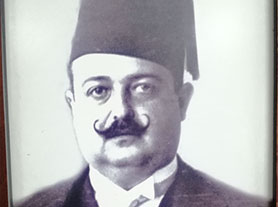
Majid Tawfiq Arslan
Majid Tawfiq Arslan was born in Choueifat in 1911, and began his studies there. He then transferred to the College des Freres Maristes in Beirut, then to the Mission Laique Francaise School in Beirut. However, he was forced to end ...
Read MoreMajid Tawfiq Arslan was born in Choueifat in 1911, and began his studies there. He then transferred to the College des Freres Maristes in Beirut, then to the Mission Laique Francaise School in Beirut. However, he was forced to end his studies in 1926, and entered politics. Then, in 1931, after a compromise was reached regarding the age required to run in the parliamentary elections, he was elected as a Member of Parliament from Mount Lebanon, succeeding his father Tawfiq. He was reelected in 1934, 1937, 1943, 1947, 1951, 1953, 1957, 1960, 1964, 1968, and 1972. He remained a Member of Parliament until his death, according to the laws extending the parliament’s mandate. He was appointed minister in several ministries. He was Minister of Agriculture seven times, Minister of National Defense 21 times, Minister of Health and Public Relief eight times, and Minister of Post and Telegraph three times. He became Minister of Justice, in addition to Minister of National Defense, in October 1968 in Prime Minister Abdallah El Yafi’s government. He was also appointed state minister in July 1973 in Prime Minister Takieddine El Solh’s government. He was then appointed Minister of Housing and Cooperatives, as well as Minister of Health and Minister of Agriculture, in July 1975 in Prime Minister Rashid Karami’s government. Then, on 15 September 1975, the ministerial portfolios were redistributed and he was appointed Minister of Public Works and Transportation, Minister of Water and Electrical Resources, and Minister of Public Health. Emir Majid took several well-known stands, which he took according to the general political climate. He led the “Barouk Revolution” during President Émile Eddé’s time in office, which ended with the intervention of Comte Damien de Martel in a manner that satisfied the Emir. In 1941, President Alfred Naccache formed a government in which the Druze sect was not represented. Emir Majid became angry and revolted against the state, staging a sit-in in Chouf. Emir Adil Arslan stepped in to resolve the situation. In 1943, Emir Majid announced the revolution along with Sabri Hamadeh and Habib Abou Chahla in Bechamoun, after the president and Prime Minister were arrested. They formed a revolutionary government, and Emir Majid was nicknamed hero of the independence. In 1948, he participated actively in the fighting in Palestine, particularly in the Al-Malikiyya battle. He received a number of Lebanese, Arab, and foreign honors, the most important of which was, in his opinion, the National Jihad Medal. His first marriage was to Ms. Emira Lamiss, the daughter of Emir Khaled Shehab. Their children are Tawfiq and Faysal. After her death, he married Ms Ermira Khawla Jumblatt. Their children are Talal, Rima, Zeina, and Najwa. He passed away on 19 September 1983.
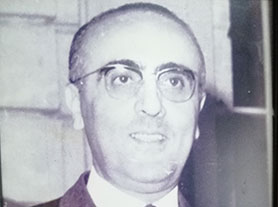
Philippe Habib Takla
Philippe Habib Takla was born in Zouk Mikael (Kesweran District) in February 1915. He studied at the College des Freres in Jounieh and at the Antoura Academy. He continued his studies at Saint Joseph University in Beirut, graduating in 1935 ...
Read MorePhilippe Habib Takla was born in Zouk Mikael (Kesweran District) in February 1915. He studied at the College des Freres in Jounieh and at the Antoura Academy. He continued his studies at Saint Joseph University in Beirut, graduating in 1935 with a degree in law. He worked as editor of the Lebanese-Syrian courts journal. He was elected as a Member of Parliament from Mount Lebanon in March 1945, after the seat was open following the death of his brother Salim. He was reelected in 1947. He was then elected as a Member of Parliament from Chouf and Aley in 1951, and from Baalbek-Hermel in the elections of 1957. He was appointed Minister of Trade and Industry and Minister of Post and Telegraph in April 1946 after Prime Minister Sami El Solh resigned from these two ministries. He was then appointed Foreign Minister and Minister of National Education in May 1946 in Prime Minister Saadi Al Munla’s government. Afterwards, he was appointed Minister of the National Economy and Minister of Post and Telegraph in July 1948 in Prime Minister Riad El Solh’s government. He was then appointed Foreign Minister and Minister of the National Economy in October 1949 in Prime Minister Riad El Solh’s government. Afterwards, he was appointed Minister of Finance and Minister of the National Economy in June 1951 in Prime Minister Abdallah El Yafi’s government. He was appointed Minister of Foreign Affairs and Displaced Persons in February 1952 in Prime Minister Sami El Solh’s government and in September 1958 in Prime Minister Rashid Karami’s government. He was appointed Minister of Foreign Affairs, Minister of the Economy, and Minister of Tourism in May 1960 in Prime Minister Ahmad Daouk’s government. He was reappointed Minister of Foreign Affairs and Displaced Persons in May and August of 1960 in both of Prime Minister Saeb Salam’s governments, and in October 1961 in Prime Minister Rashid Karami’s government, and in both of Prime Minister Hussein Al Oueini’s governments, in February 1964 and November 1964. He was appointed Minister of Foreign Affairs and Displaced Persons and Minister of Justice in April 1966 in Prime Minister Abdallah El Yafi’s government. He was also appointed Minister of Foreign Affairs and Displaced Persons in October 1974 in Prime Minister Rachid Solh’s government. Finally, he was named Minister of Foreign Affairs and Displaced Persons, Minister of National Education, and Minister of Public Planning in July 1975 in Prime Minister Rashid Karami’s government. He took over governorship of the Banque du Liban in April 1964. He was appointed Lebanese Ambassador in Paris from 1968-1972. He gave a number of lectures in the Lebanese Cenacle. He also received several Lebanese and foreign honors. He married Ms Odette Maalouf. Their children are Habib and Georges. He passed away on 10 July 2006.
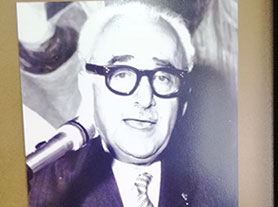
Fouad Iskander Rizk
Fouad Iskander Rizk was born in Machghara in the Western Baqaa District in 1900. He moved to Aleppo with his parents, where he studied at the College des Freres. He was forced to leave school due to poverty, and his ...
Read MoreFouad Iskander Rizk was born in Machghara in the Western Baqaa District in 1900. He moved to Aleppo with his parents, where he studied at the College des Freres. He was forced to leave school due to poverty, and his family’s need for money. He worked as a clerk in a shop, studying law in his free time until he earned his degree in 1918. He was not able to work as an attorney until 1926, and he began teaching in the Law Institute. He published the journal Al-Muhami in partnership with his colleague Khalil Tanous, and was responsible for the journal’s success. He oversaw the official newspaper under President Bechara El Khoury. He was a candidate for membership of the Bar Association. During the election, he dropped a blank ballot in the election box because he did not want to win on his own vote, and he lost the election by one vote. He was given the nickname “Blank Ballot.” He won in the Bar Association elections in 1958, and was elected president of the Bar. He participated in founding the Progressive Socialist Party in 1949. He became Commissioner of Knowledge and Education in 1950, and then Guide in 1955. In that same year, he also became the first deputy to the president of the party. He was not able to reach the Lebanese Cenacle in 1953. He was appointed Minister of Justice in December 1966 in Prime Minister Rashid Karami’s government. During his time as minister, he issued a decision that forbade the lawyer who holds the position of Minister of Justice from practicing law for a two-year period after leaving the ministry. He taught law in the Lebanese University before and after his time as minister. He received the Lebanese Gold Medal of Merit. He married Ms Marguerite Siman. Their children are Fouad, Nazih, Sami, Naji, and Mona. After his wife passed away, he married Ms Eilene Bouilla. Their children are Jihad and Hadia. He passed away on 19 December 1988. After his death, General Michel Aoun awarded him the Order of Merit at the rank of Grand Cordon posthumously.
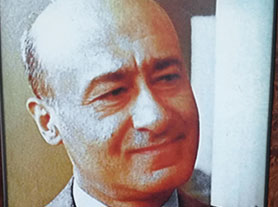
Fouad Boutros
Fouad Boutros was born in Beirut in 1917, but his birth year was recorded in the official registry as 1914. He studied at the College des Freres in Beirut, and earned both the Lebanese and French baccalaureate. Likewise, he completed ...
Read MoreFouad Boutros was born in Beirut in 1917, but his birth year was recorded in the official registry as 1914. He studied at the College des Freres in Beirut, and earned both the Lebanese and French baccalaureate. Likewise, he completed a degree in French law at the Jesuit University, as well as a diploma in applied legal lessons. He began his professional life as a judicial assistant at the Mixed Court of Appeals from 1939-1942. He then began working in the judiciary, starting as a judge in the civil court, and then became an investigative judge in Mount Lebanon. He then became a judge at the Mixed Courts in Beirut, and then an investigative judge at the military court in 1946. In 1947, he resigned to work as a lawyer with Fouad Rizk, Georges Bechara, Mohammad Jaroudi, and others. He was elected as a Member of Parliament from the Beirut I district in 1960, and was reelected by acclamation in 1964. He was elected deputy speaker of parliament in July 1960, and again in October of the same year. He was appointed Minister of Education and Minister of Public Planning in October 1959 in Prime Minister Rashid Karami’s government. In October 1961, he was appointed Minister of Justice in Prime Minister Rashid Karami’s government. Then, in April 1966, he was appointed deputy Prime Minister, Minister of National Education, and Minister of National Defense in Prime Minister Abdallah El Yafi’s government. He was also appointed deputy Prime Minister, Minister of Foreign Affairs and Displaced Persons, and Minister of Tourism in February 1968 in Prime Minister Abdallah El Yafi’s government. He was also appointed deputy Prime Minister, Minister of Foreign Affairs and Displaced Persons, and Minister of National Defense in December 1976 in Prime Minister Selim Hoss’s government. Afterwards, he was appointed deputy Prime Minister and Minister of Foreign Affairs and Displaced Persons in July 1979 in Prime Minister Selim Hoss’s government. Finally, he was appointed deputy Prime Minister and Minister of Foreign Affairs and Displaced Persons in October 1980 in Prime Minister Shafik Wazzan’s government. He produced various writings and lectures in both Arabic and French. He wrote two books, one in Arabic and the other in French, entitled Writings on Politics. He was also the head of the National Commission for the Parliamentary Electoral Law from 2005-2006. He presented his report along with a draft law on this issue, an amended version of which was adopted by the parliament and passed into law in 2008. Fouad Boutros was one of the pillars of the Chehab approach. Also, during his time in parliament, he took over the position of Secretary-General of the Independent Parliamentary Bloc from 1960-1968. He received a number of Lebanese, Arab, and foreign honors. He married Ms Tatiana Shahada. Their children are Georges, Mara, and Rima. He passed away on 3 January 2016.
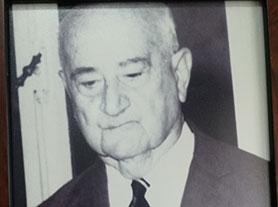
Gibran Qaysar Nahhas
Gibran Qayser Nahhas was born in Tripoli in 1891. He studied at the Jesuit Saint Joseph University in Beirut, where he completed secondary school. In 1920, he was appointed Governor of the North Governorate. After the constitution was established, he was ...
Read MoreGibran Qayser Nahhas was born in Tripoli in 1891. He studied at the Jesuit Saint Joseph University in Beirut, where he completed secondary school. In 1920, he was appointed Governor of the North Governorate. After the constitution was established, he was appointed a Member of the Senate, representing the North Governorate. After the Senate was disbanded in 1927, its members joined the parliament. Nahhas continued as a Member of Parliament until 1929. He was reelected in 1947. He was a member of the General Administration Committee, and was elected deputy speaker of parliament several times. He was appointed Deputy Prime Minister in October 1949 in the government of Prime Minister Riad El Solh. Two weeks later, he was also appointed Minister of the National Economy, as well as Minister of Post and Telegraph. Likewise, in May 1960, he was appointed Minister of Justice and Minister of National Education and Fine Arts in the government of Prime Minister Ahmad Daouk. The parliament had disbanded in early May 1960. Therefore, this ministry did not present its ministerial statement. Rather, its activities were limited to holding the parliamentary elections. After this, he was appointed deputy Prime Minister and Minister of Justice in the government of Prime Minister Hussein Al Oueini twice consecutively, first in February 1964, and then again in September 1964. He was a member of the Orthodox Congregation Council in Tripoli, and of the General Congregation Council in Lebanon. He passed away on 15 June 1968.
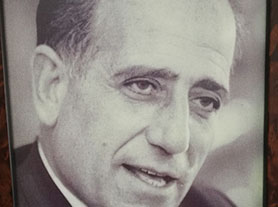
Nassim Mikhael Majdalani
Nassim Mikhael Majdalani was born in Beirut in 1912. He completed primary and secondary school at the French Lycee. He then studied law at the Jesuit University, and finished his studies at the University of Lyon in France, where he ...
Read MoreNassim Mikhael Majdalani was born in Beirut in 1912. He completed primary and secondary school at the French Lycee. He then studied law at the Jesuit University, and finished his studies at the University of Lyon in France, where he earned his degree. He returned to Lebanon in 1936, where he practiced law, working at the office of Habib Abou Chahla. In 1942, he moved to working in trade and business, and to administering the bank that had belonged to his father. In 1943, he established the Ghassanids Organization, and obtained a license for it with permission to start a newspaper in its name. He remained loyal to Sheikh Bechara El Khoury until 1946, when he moved to the opposition. The Ghassanids Organization was disbanded, and its newspaper closed, so Nassim Majdalani joined Abdul Hamid Karami, and participated in founding the Liberation Committee, which was later joined by Camille Chamoun and Kamal Jumblatt. In 1949, he participated in establishing the Progressive Socialist Party. He was appointed foreign commissioner, then third Deputy to the President of the party. He was elected as a Member of Parliament from the Beirut I district in 1957. He was then reelected in 1960, 1964, and 1968. He was a member of the following parliamentary committees: Rules of Procedure, National Economy, and Foreign Affairs. He was also elected Deputy Speaker of parliament in 1968 and 1971. He was appointed deputy Prime Minister and Minister of Justice in August 1960 in Prime Minister Saeb Salam’s government. In November 1965, he was appointed deputy Prime Minister and Minister of Justice in Prime Minister Hussein Al Oueini’s government. He was also appointed deputy Prime Minister and Minister of the National Economy in January 1969 in Prime Minister Rashid Karami’s government. In November 1969, he was appointed Minister of Foreign Affairs and Displaced Persons in Prime Minister Rashid Karami’s government, and then Minister of the Economy in the same government until August 1970, succeeding Suleiman Frangieh, who had been elected President of the Republic. Nassim Majdalani was known for his Arabist orientation and his support of liberation issues, as well as his opposition to bribery and disorder. He received a number of honors, including the Order of St. Vladimir (the patriarch of Moscow) and the Grand Order of Tunisia. He married Ms Hilda Matar. Their children are Mirna and Rawi. He passed away on 14 December 1991.
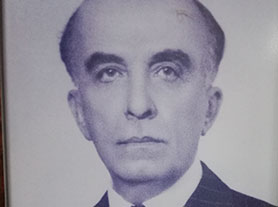
Youssef Hanna El Sawda
Youssef Hanna El Sawda was born in Bikfaya, in the Matn District, in 1888, where he completed primary school. He then continued his secondary education at the Jesuit College, where he earned his degree in 1905. He traveled to Egypt ...
Read MoreYoussef Hanna El Sawda was born in Bikfaya, in the Matn District, in 1888, where he completed primary school. He then continued his secondary education at the Jesuit College, where he earned his degree in 1905. He traveled to Egypt and joined the French Law Office in Cairo, earning his degree in 1908. He then climbed the ranks of the Mixed Courts in Alexandria, where he lived until 1922. He returned to Lebanon early in the Mandate period. In 1925, he established the scouting group with Abdallah Faris. He then founded the Conservative Party, which he headed from 1926-1927. He was elected as a Member of Parliament from Mount Lebanon in the elections of 1925, succeeding Naoum Labaki. He was also appointed as a Member of Parliament from the North Governorate in July 1929, and was a member Administration and Justice Committee. In September 1958, he was appointed Minister of Justice and Minister of Social Affairs in Prime Minister Rashid Karami’s government, but this government did not appear before the parliament, and did not present its ministerial statement. Youssef El Sawda was an eloquent orator and a skilled lawyer. He published the newspaper Al-Raiah in 1926. He was Lebanon’s Ambassador to Brazil from 1946-1952, and ambassador to the Vatican from 1953-1955. He wrote a number of publications, including Foreign Privileges, Lebanon’s Basic Law 1864, For the Sake of Lebanon, The Lebanese Question, and Between the Old and the New, in addition to a book of memoirs that includes many of his speeches and articles. He passed away on 1 August 1969.
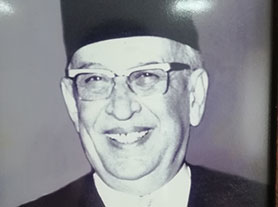
Hussein Ahmad Al Oueini
Hussein Ahmad Al Oueini was born in the Zuqaq Al-Blat area of Beirut on 24 December 1900. He completed primary and intermediate school at the Saint Joseph of the Apparition School and the Patriarchate School. He stopped his formal studies ...
Read MoreHussein Ahmad Al Oueini was born in the Zuqaq Al-Blat area of Beirut on 24 December 1900. He completed primary and intermediate school at the Saint Joseph of the Apparition School and the Patriarchate School. He stopped his formal studies at the age of fifteen due to the war, but he continued with private lessons. Then, he joined the struggle against the French Mandate. As a result, he was imprisoned, and then exiled. He moved to Palestine, then Egypt, and then the Hijaz, working in trade. He returned to Lebanon after it gained its independence to work as a representative of the Kingdom of Saudi Arabia before it established an embassy in Lebanon. In 1951, he participated in founding BLOM Bank (the Bank of Lebanon and the Mahjar), and then he became the head of its board of directors. He also established the Islamic Infirmary. He was elected as a Member of Parliament from Beirut in 1947, and was a member of the Finance Committee, as well as head of the Tourism Committee. He was appointed Minister of Finance in July 1948 in Prime Minister Riad El Solh’s government. He was also appointed Minister of Finance and Minister of Post, Telegraph, and Telephone in October 1949 in Prime Minister Riad El Solh’s government, then he was appointed Prime Minister, Minister of Interior, Foreign Minister, Minister of National Defense, and Minister of Finance in February 1951. His government was granted confidence unanimously. Afterwards, he was appointed Foreign Minister, Minister of Justice, and Minister of Public Planning in October 1958 in Prime Minister Rashid Karami’s government, but he soon resigned from the Ministry of Justice and the Ministry of Public Planning. Philippe Takla was appointed in his place in the Ministry of Justice and Fouad Boutros was appointed to the Ministry of Public Planning. He became Prime Minister again, as well as Minister of Interior and Minister of National Defense, in February 1964 and September 1964. He was appointed Prime Minister for the fourth time, as well as Minister of Defense, in November 1964. He was appointed Minister of Foreign Affairs and Displaced Persons, Minister of Justice, Minister of National Defense, and Minister of the National Economy in October 1968 in Prime Minister Abdallah El Yafi’s government. During his time in the ministry, he worked to ensure that the Lebanese Lira was backed by gold and foreign currency. He received a number of honors, including the National Order of the Cedar at the rank of Grand Cordon, the Legion of Honor at the rank of Grand Cordon, the Austrian Sash of Merit, and the Sash of the Chinese Star. He married Ms Shafiqa Al-Jaroudi. They had one daughter, Nada. He passed away on December 1971. The municipality of Beirut named one of the streets in the Dar El Fatwa area for him.
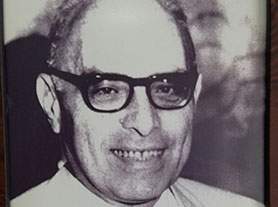
Emile Daoud Tyan
Émile Daoud Tyan was born in Beirut in 1901. He studied at the Pères Jésuites school in Beirut, and then studied law in the Jesuit University, graduating as a lawyer in 1921. He continued his higher education, and earned his doctorate ...
Read MoreÉmile Daoud Tyan was born in Beirut in 1901. He studied at the Pères Jésuites school in Beirut, and then studied law in the Jesuit University, graduating as a lawyer in 1921. He continued his higher education, and earned his doctorate from the University of Lyon. He began working in the office of the attorney Fabia. Then, he returned to Lebanon and began teaching law in Saint Joseph University in 1927. Then, starting in 1929, he began working exclusively in teaching at Saint Joseph University. He was appointed counsellor in the Court of Appeals, and in 1948 became the presiding judge of the Court of Cassation. He was appointed Minister of Justice on 3 January 1957 in Prime Minister Sami El Solh’s government, after El Solhresigned from this Ministry. He was also appointed Minister of Justice in July 1965 in Prime Minister Rashid Karami’s government. He wrote a number of publications, the most prominent of which are The Judicial Organization in Islam and Commercial Law in Two Volumes. He received several honors, including the Lebanese Gold Medal of Merit and the Legion of Honor at the rank of Officer. He married Ms Hoda Kassab. Their children are Henri, Samir, Nada, Daoud, and Samia. He passed away on 1 November 1977.
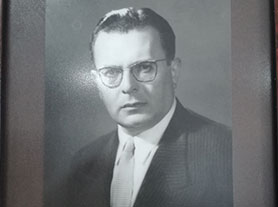
Salim Nassib Lahoud
Salim Nassib Lahoud was born in Baabdat (Matn District) in 1910. He completed his early schooling in Baabdat, and then vistited the Antoura School until 1927. He traveled to France and studied in the University of Lille, where earned a ...
Read MoreSalim Nassib Lahoud was born in Baabdat (Matn District) in 1910. He completed his early schooling in Baabdat, and then vistited the Antoura School until 1927. He traveled to France and studied in the University of Lille, where earned a degree in mechanical engineering in 1932. He worked as an engineering professor in Saint Joseph University, and in the military school. He was appointed director of the Beirut Water Authority in 1940. In 1952, he was appointed head of the management board of the Litani River Authority. He was elected as a Member of Parliament from Mount Lebanon, North Matn District, in 1954, succeeding his Uncle Émile Lahoud. He was reelected in 1957, 1964, and 1968. He participated in the work of the Foreign Affairs Committee and the Public Works Committee. He was appointed Minister of National Education in July 1955 in Prime Minister Sami El Solh’s government. He was also appointed Minister of Foreign Affairs and Displaced Persons in September 1955 in Prime Minister Rashid Karami’s government. He was then appointed Minister of Public Works and Minister of Justice in March 1956 in Prime Minister Abdallah El Yafi’s government. In June 1956, he was appointed Minister of Foreign Affairs and Displaced Persons in Prime Minister Abdallah El Yafi’s government. Afterwards, in August 1957, he was appointed Minister of Public Works in Prime Minister Sami El Solh’s government. In 1933, he founded the Lebanese scouting movement, which he headed until he passed away. He participated in establishing several important projects in the fields of water and electricity supply, including the Litani river project. He received a number of Lebanese, Arab, and foreign awards and honors. He married Ms Nadia Yared. Their children are Nassib and Samir. He passed away on 7 December 1971.
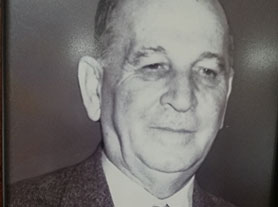
Sami Abdel Rahim El Solh
Sami Abdel Rahim El Solh was born on 7 May 1887 in the Palestinian village of Acre, which was part of the Ottoman province of Beirut. He completed his early studies in Acre, and then attended secondary schools in Beirut, ...
Read MoreSami Abdel Rahim El Solh was born on 7 May 1887 in the Palestinian village of Acre, which was part of the Ottoman province of Beirut. He completed his early studies in Acre, and then attended secondary schools in Beirut, Turkey, and Greece, where he learned Greek, as well as Turkish and French. Then, he completed his university studies in Paris, earning degrees in law and political science in 1912. Afterwards, he returned to Lebanon. In Aleppo, he was appointed general agent of the Baghdad Railroad, then general agent of the Aleppo Railroad. After World War I, he returned to Beirut and entered the judiciary, where he remained for 22 years. He began as a public lawyer, and then became presiding judge of the Court of Appeals, then counsellor in the Court of Cassations, before finally becoming a general prosecutor for the Court of Cassations. He was elected as a Member of Parliament from Beirut in 1943, 1947, 1951, 1953, 1957, and 1964. After 1965, he held the “Father of the House” position as the oldest member in the parliament. He also participated in the parliamentary committees’ work. He was head of the Social Affairs Committee, then head of the Administration and Justice Committee in 1945. He was also a member of the National Defense Committee and the Foreign Affairs Committee. Sami El Solh was appointed Prime Minister eight times, in 1945, 1942, 1952, 1954, 1955, 1956, 1957, and 1958. He also headed several ministries while acting as Prime Minister. He was the Minister of Finance and Minister of Sustenance, Trade, and Industry (July 1942). He was then Minister of Trade, Industry, and Supply and Minister of Post and Telegraph (August 1945). He was also Minister of Interior (February 1952) and Minister of Public Planning (July 1955). Additionally, he was Minister of Interior, Minster of Justice, and Minister of News (November 1956). He was also Minister of Interior, and Minister of Justice (August 1957), and finally Minister of Interior (March 1958). Sami El Solh was known for his defense of Palestinian rights, and of Arab unity. He warned of British plots, and raised the slogan “Palestine is Arab.” He condemned the execution of Antoun Saadeh, the leader of the Syrian Social Nationalist Party, in 1949. He then carried the banner of the opposition against President Bechara El Khoury, and helped Camille Chamoun ascend to the presidency in 1952. He wrote several books, including Landmarks and Lebanon: Political Futility and the Unknown Future, as well a book of his memoirs, collected by Hanna Abou Rashed and Henri Moukheiber. He married Ms Bilqis Reda El Solh. Their children are May and Abdul Rahman. He passed away on 6 November 1968.
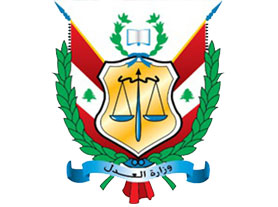
Gabriel Asaad Murr
He was born in Bteghrine (Matn District) in 1895. He completed his primary school education at an English and Protestant school in Beirut, then completed secondary school at the American University, where he earned a diploma in trade in 1910. He ...
Read MoreHe was born in Bteghrine (Matn District) in 1895. He completed his primary school education at an English and Protestant school in Beirut, then completed secondary school at the American University, where he earned a diploma in trade in 1910. He traveled to the United States of American, where he worked in many types of trade, including movies. He returned to Beirut in 1932. He was elected as a Member of Parliament from Mount Lebanon in 1943 on the National Bloc list, and again in 1947 and 1953. During his time in parliament, he was elected as a member of several parliamentary committees, including the Finance Committee, the Petitions and Complaints Committee, and the Foreign Affairs Committee. In August 1945, he was appointed deputy Prime Minister and Minister of Public Works in the government of Prime Minister Sami El Solh. In May 1946, he was also appointed deputy Prime Minister and Minister of Public Works in the government of Prime Minister Saadi Al Munla. Then, in December 1946, he was appointed Minister of Public Works in the government of Prime Minister Riad El Solh. Later, in June 1947, he was appointed deputy Prime Minister and Minister of Public Works in the government of Prime Minister Riad As-Solh. In July 1948, he was appointed deputy Prime Minister and Minister of Interior in the government of Prime Minister Riad El Solh. He was appointed Minister of Public Works in both the governments of Prime Minister Abdallah El Yafi, in August 1953 and in March 1954. In September 1954, he was reappointed deputy Prime Minister and Minister of Interior in Prime Minister Sami El Solh’s government. He was also appointed deputy Prime Minister, as well as Minister of Justice and Minister of Health and Public Relief, in July 1955 in Prime Minister Sami El Solh’s government. He was the Head of the Lebanese delegation to Egypt to sign the charter of the Arab League. On 20 July 1949, he resigned from the Ministry of the Interior in protest at the search of the Kataeb (Phalanges) headquarters without his knowledge. He received several honors from Lebanon, Iraq, and Syria. He married Ms Rouja, who was Hungarian. He passed away on 13 March 1966. The municipality of Beirut named one of the streets in the Mar Elias area of Beirut after him.
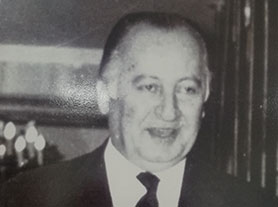
Fouad Nicolas Ghosn
He was born in Amioun (Koura District) in 1911. He studied at the College des Freres in Tripoli. He then traveled to France and studied law in Montpellier University. He graduated in 1935 with a degree in law, and returned ...
Read MoreHe was born in Amioun (Koura District) in 1911. He studied at the College des Freres in Tripoli. He then traveled to France and studied law in Montpellier University. He graduated in 1935 with a degree in law, and returned to Beirut to work as an attorney. In 1942, he was appointed to the General Administrative Cadre of the state, and he worked as deputy Governor of the Marjayoun, Batroun, and Jdeidet El Matn districts until 1953. He was elected as a Member of Parliament from the North Governorate in 1953, and was reelected in 1960, 1964, 1968, and 1972. He remained a Member of Parliament until his death according to the laws extending the parliament’s mandate. He participated in the work of parliamentary committees, and was a member of the following committees: Finance and Budget, Administration and Justice, Foreign Affairs, and National Defense. He was also elected deputy speaker of parliament in both 1963 and 1972. In September 1955, he was appointed Deputy Prime Minister and Minister of Justice in Prime Minister Rashid Karami’s government. He was appointed Minister of National Education and Minister of Post, Telegraph, and Telephone in June 1956 in Prime Minister Abdallah El Yafi’s government. After that, in August 1960, he was appointed Minister of Guidance and News in Prime Minister Saeb Salam’s government. Likewise, he was appointed Deputy Prime Minister, Minister of News, and Minister of the Post, Telegraph, and Telephone in October 1968 in Prime Minister Abdallah El Yafi’s government, but the government did not appear before the parliament, and resigned after one week. Then, in November 1969, he was reappointed Deputy Prime Minister and Minister of the Post, Telegraph, and Telephone in Prime Minister Rashid Karami’s government. Afterwards, he was appointed deputy Prime Minister and Minister of National Defense in April 1973 in Prime Minister Amin Al-Hafiz’s government, which did not appear before the parliament. Finally, he was appointed deputy Prime Minister, and Minister of Public Works and Transportation in July 1973 in Prime Minister Takieddine El Solh’s government. He married Ms Nazira Andraous. Their children are (the Member of Parliament) Nicolas, Elias, Minerva, and Doula. He passed away on 13 October 1984.
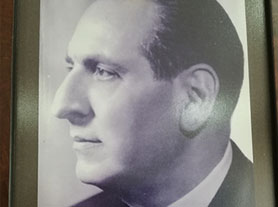
Charles Iskander Helou
Charles Iskander Helou family hails from Baabda, and he was born in Beirut on 25/9/1913. He completed secondary school at the Pères Jésuites School, graduating in 1929. He then graduated from Saint Joseph University in 1934. He worked as a ...
Read MoreCharles Iskander Helou family hails from Baabda, and he was born in Beirut on 25/9/1913. He completed secondary school at the Pères Jésuites School, graduating in 1929. He then graduated from Saint Joseph University in 1934. He worked as a lawyer, and joined the office of Petro Trad. He developed a passion for journalism, and stopped practicing law for some time. He became known for writing fierce oppositionist articles, which he published in the magazine Information. In 1932, he established the newspaper L’Eclair du Nord in Aleppo. Then Sheikh Bechara El Khoury invited him to take over as Editor of the newspaper Le Jour, which was published by the Constitutional Bloc. He remained with this newspaper until 1946, when he was sent as the first Minister Counselor and extraordinary delegate to the Vatican. He was elected Member of Parliament from Beirut in the elections of 1951, and was a member of the Administration and Justice Committee, as well as the Foreign Affairs Committee. He was appointed Minister of Justice and Minister of News in October 1949, but he resigned after only a few months. In June 1951, he was appointed Minister of Foreign Affairs and Emigrants in the government of Prime Minister Abdallah El Yafi. Likewise, he was appointed Minister of Justice and Minister of Health and Public Relief in September 1954 in the government of Prime Minister Sami El Solh, but he resigned in May of the following year. Then, in September 1958, he was appointed Minister of the National Economy and Minister of News in the government of Prime Minister Rashid Karami, which did not appear before parliament. He was appointed Minister of National Education in February 1964 in the government of Prime Minister Hussein Al Oueini, and minister of state in July 1979 in the government of Selim Hoss. He was elected president of the republic on 18 August 1964 with a majority of 92 votes out of 99, succeeding President Fouad Chehab. He participated in founding the National Council for Tourism, and worked for a number of years as the head of the Parliamentary Council for La Francophonie. He gave many lectures, particularly in the Lebanese Cenacle. He also published over two thousand articles and research papers in several different languages, the most common of which was French. Likewise, he wrote several books, the most important of which is The Question of the Palestinian Refugees, which was translated into five languages. He received several Lebanese, Arab, and foreign honors, among them the National Order of the Cedar, the Grand Cross, and the French Legion of Honor. He married Ms Nina Trad, the niece of President Petro Trad. He passed away on 7 January 2000.
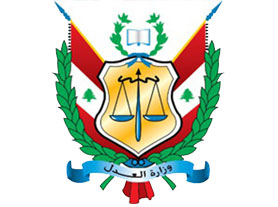
Mohieddine Zakariya Al Nsouli
Mohieddine Zakariya Al Nsouli was born in Beirut in 1898. He studied first at the Al-Marissa Mosque’s school, and then continued his studies at the College des Freres and the Dar Al-Uloom School in Beirut. He then entered the American ...
Read MoreMohieddine Zakariya Al Nsouli was born in Beirut in 1898. He studied first at the Al-Marissa Mosque’s school, and then continued his studies at the College des Freres and the Dar Al-Uloom School in Beirut. He then entered the American University of Beirut, and graduated in 1921 with a bachelor’s degree in economics and education. At the outset of his professional life, he began working in trade. In 1936, he founded the newspaper Beirut, and used it as a platform to express his patriotic and nationalist convictions. Its motto was “Arabism Above Everything.” It was one of the most prominent newspapers of its time, and helped him to be elected Head of the Press Association in 1944. He was appointed as a Member of Parliament from Beirut in 1937, and was elected to be a member of the Finance Committee and the Trade and Agriculture Committee. He was appointed Minister of Justice and Minister of News in April 1953 in the government of Prime Minister Saeb Salam. Likewise, in September 1954, he was appointed Minister of Justice and Minister of News in the government of Prime Minister Sami El Solh. Then, in July 1955, he was appointed Minister of Interior and Minister of News in the government of Prime Minister Sami El Solh. He was then put in charge of the Ministry of Finance in September 1955 after Pierre Eddé resigned from it. He received a number of honors, among them the Legion of Honor at the rank of Officer, the Order of the Two Rivers, the Jordanian Order, and the Italian Sash. He married Ms Nour Abdul Hamid Ghandour. Their children are Salwa, Zakariya, Hudla Marwan, Suhair, and Ahmad Khaldoun. He passed away in Beirut on 8 October 1961. The municipality of Beirut named one of the streets in Beirut for him.
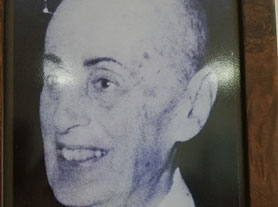
Alfred Georges Naccache
Alfred Georges Naccache was born in Beirut on 3 May 1888. He completed his secondary education at the Jesuit Saint Joseph School in 1904. He traveled to France and joined the Sorbonne University, where he earned his law degree in ...
Read MoreAlfred Georges Naccache was born in Beirut on 3 May 1888. He completed his secondary education at the Jesuit Saint Joseph School in 1904. He traveled to France and joined the Sorbonne University, where he earned his law degree in 1909. He moved to Cairo, where he worked in two law offices owned by lawyers of Italian decent. During this time, he sent articles in support of Lebanon’s independence to a number of newspapers, the most prominent of which were L’Orient and Le Reveil. He was appointed as an advisor in the state council during the period of the Mandate. He was then appointed as the head of the Court of First Instance, and then of the Criminal Court, in 1929. In 1937, he was elected head of the Red Cross. The French High Commission appointed him President of the State, with the support of seven ministers, on 9 April 1941. Then, General Catroux appointed him president of the republic on 24 October 1941. He resigned from the presidency on 20 September 1943, leading to the election of a new President of the Republic. He was elected as a Member of Parliament from Beirut in 1943 and again in 1951. He participated in the work of the parliamentary committees, and was head of the Foreign Affairs Committee from 1956-1957. He was also a member of the Social Affairs Committee and the Health and Public Relief Committee. He was appointed Foreign Minister in August 1953, in the government of Prime Minister Abdallah El Yafi. In March 1954, he was appointed Foreign Minister and Minister of Justice in the government of Prime Minister Abdallah El Yafi. Finally, in June 1956, he was appointed Minister of Justice in the government of Prime Minister Abdallah El Yafi. He received a number of Lebanese, Arab, and foreign honors. He passed away on 26 September 1978. The municipality of Beirut named the street leading from Hotel-Dieu to Achrafieh after him.
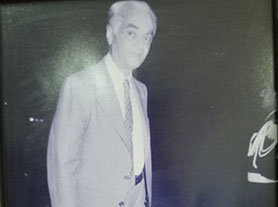
Bashir Mahmoud Al Aawar
Bashir Mahmoud Al Aawar was born in Qarnayel, in the Baabda District, in 1909. He studied at the National University in Aley, and the Lycee in Beirut. In his youth, he joined the military. After graduating from the Jesuit University ...
Read MoreBashir Mahmoud Al Aawar was born in Qarnayel, in the Baabda District, in 1909. He studied at the National University in Aley, and the Lycee in Beirut. In his youth, he joined the military. After graduating from the Jesuit University in 1932 with a degree in law, he began working in the office of Elias Namur. He then entered the judiciary, and held several positions, including magistrate in Jdeidet El Matn, then investigative judge in Mount Lebanon, and then in the North Governorate in 1951. Afterwards, he resigned from the judiciary to enter politics. He was elected as a Member of Parliament from the Baabda District in the elections of 1951, 1953, 1957, 1960, 1968, and 1972, and remained in parliament until his death according to the laws extending the Lebanese parliament’s mandate. During his time in parliament, he was the head of a number of parliamentary committees, including serving as the head of the Administration and Justice Committee from 1955-1957. He was also a member of the Finance and Budget Committee, the Foreign Affairs Committee, the Education Committee, the National Defense Committee, and the Economy Committee. He was also head of the Rules of Procedure Committee several times. In June 1951, he was appointed Minister of Health and Public Relief in the government of Prime Minister Abdallah El Yafi. Then, in April 1953, he was appointed Minister of Public Works in the government of Prime Minister Saeb Salam. He was then appointed Minister of Justice and Minister of Post, Telegraph, and Telephone in August 1953 in Prime Minister Abdallah El Yafi’s government. Later, in March 1958, he was named Minister of Justice in the government of Prime Minister Sami El Solh. He was again named Minister of Justice in May 1972 in the government of Prime Minister Saeb Salem. In April 1973, he was appointed Minister of Interior in the government of Prime Minister Amin Al-Hafiz, which did not appear before the parliament. In 1958, he was elected as the grand master of the Freemason National Grand Lodge Syria-Lebanon, and worked to incorporate the lodge in to the large Grand East Lodge. He stepped down from his position in the lodge in 1960. He was appointed Governor of the North Governorate in 1964, after his loss in the parliamentary elections. There, he carried out a number of significant projects, for which he is still remembered today. He received several Lebanese and foreign honors, and is considered one of the most prominent figures in the fields of legislation and the judiciary. He married Ms Iqbal Abu Raslan He passed away on 10 July 1989.
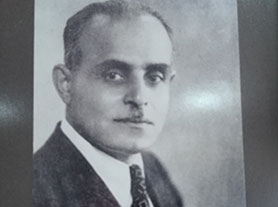
Fouad Jirjis El Khoury
Fouad Jirjis El Khoury was born in town of Hadath, in the Baabda District, in 1889. He studied at several schools. He then studied law under jurists, the most prominent of whom were Melhem and Najib Khalaf, and Salim El ...
Read MoreFouad Jirjis El Khoury was born in town of Hadath, in the Baabda District, in 1889. He studied at several schools. He then studied law under jurists, the most prominent of whom were Melhem and Najib Khalaf, and Salim El Meouchi. He began practicing law in 1910. Politics attracted him, and he became involved in them early on with his election as Head of the municipality of Hadath in 1916. He was also elected as a member of the Bar Association Council for several terms, before being elected President of the Bar from 1939-1942. He entered the political fray with the Constitutional Party in 1943, where he served as the Secretary-General for several years. He was elected as a Member of Parliament from Baabda in 1951. He was a member of the following councils: Administration and Justice, News, Public Works, and Post and Telegraph. He was elected Deputy Speaker of parliament in 1951 and 1952. In February 1952, he was appointed deputy Prime Minister and Minister of Justice in the government of Prime Minister Sami El Solh. He took a strong interest in the Orthodox sect’s issues, and he served the sect as both a lawyer and as a member of the Congregation Council of the Archdiocese of Mount Lebanon from 1920-1978, as well as a member of the General Congregation Council of the Patriarchate from 1950-1975. He participated in editing some of the materials in the Lebanese encyclopedia, and wrote several publications including “The Practice of Law,” “Fifty Thoughts,” “From the Corners,” “The Prosecution in Lebanon,” “On the Edge of One Hundred,” and “On Life’s Pavement.” He was honored by President Fouad Chehab in 1964, by President Suleiman Frangieh in 1973, and by the Cultural Movement – Antelias in 1988. He received several honors, among them the Lebanese Order of Merit and the National Order of the Cedar at the ranks of Officer and Commander, as well as medals from the Greek Orthodox Patriarch of Jerusalem and the Patriarch of Alexandria. He married Ms Wajiha Bulan. Their children are May, Nadia, George, Assam, and Hoda. He passed away in 1990.
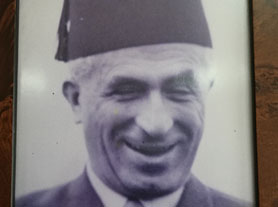
Moussa Melhem Mubarak
Moussa Melhem Mubarak was born in Antoura (Keserwan District) in 1901. He studied first at the Antoura School, and then continued his studies in the American University, where he earned his L.L.B. He then studied law in Saint Joseph University, ...
Read MoreMoussa Melhem Mubarak was born in Antoura (Keserwan District) in 1901. He studied first at the Antoura School, and then continued his studies in the American University, where he earned his L.L.B. He then studied law in Saint Joseph University, where he earned his degree. He also earned a degree in economics and business. In 1918, the French appointed him as an attaché to the High Commissioner. He continued in this position until 1941, when he was appointed Director General of the Ministry of National Education and Fine Arts, then General Inspector, then finally Director of foreign trade in the Ministry of Supply from 1942-1943. President Bechara El Khoury appointed him Director-General to the presidency of the republic, then head of the Supreme Council of Common Interests until the common customs union was separated in 1950. Afterwards, he was appointed head of the Supreme Council for Customs, and continued in this position until 1958. In September 1952, he was appointed Minister of Justice, Minister of Finance, Minister of Post and Telegraph, and Minister of Social Affairs in the government of Prime Minister Nazem Akkari, but the government resigned one week after its formation. In September 1952, he was also appointed Minister of Foreign Affairs and Displaced Persons, Minister of Public Works, and Minister of the Post, Telegraph, and Telephone in the government of Khaled Chehab, but he resigned in February 1953. In 1958, he was appointed as the Lebanese Ambassador to France, then as Ambassador to Italy. He continued as Ambassador until his retirement in 1965. He received 27 medals, both foreign and Lebanese. He married Ms Nada Abu Sawan. Their children are Samir, Melhem, and Hanna. He passed away in Canada on 9 May 1980.
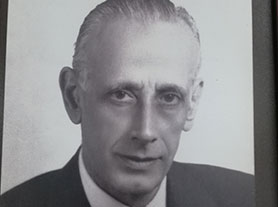
Bassil Najib Trad
Bassil Najib Trad’s family was from Beirut, and he was born in the town of Brummana in the Matn District on 31 December 1900. He studied at the Pères Jésuites School in Beirut, and studied law in the Jesuit University ...
Read MoreBassil Najib Trad’s family was from Beirut, and he was born in the town of Brummana in the Matn District on 31 December 1900. He studied at the Pères Jésuites School in Beirut, and studied law in the Jesuit University as well, graduating as a lawyer. He worked as an employee in the Banca di Roma bank, and became vice-president of the bank. In 1943, he was appointed as a member of the Supreme Council for Common Interests between Lebanon and Syria. Then, in 1949, after economic ties with Syria were cut, he was appointed as a member of the Supreme Council for Lebanese Customs, before being appointed secretary-general of the Ministry of the Economy from 1949-1952. He was the Head of the El Contoire National Association for trade in 1935, and was appointed Vice-President of the Chamber of Commerce and Industry in 1966. He was elected Deputy-Mayor of the municipality of Beirut in 1963. In September 1952, he was appointed Deputy Prime Minister, as well as Minister of the National Economy, Minister of Public Works, Minister of National Education, and Minister of Health and Public Relief in the government of Prime Minister Nazem Akkari, but the government resigned 5 days after its formation. Then, he was appointed Minister of the National Economy, Minister of Social Affairs, Minister of Justice, and Minister of Finance in September 1952 in the government of Prime Minister Fouad Chehab, but this government did not appear before the parliament, and did not present its ministerial statement. Its purpose was to oversee the presidential elections following the tense situation at the end of President Bechara El Khoury’s time in office. He received the National Order of the Cedar at the rank of Grand Officer, the Italian Order of Merit, and the Medal of Paris. He married Ms Jeanne Arman. Their children are Najib, Leila, and Mona. He passed away on 19 January 1981.
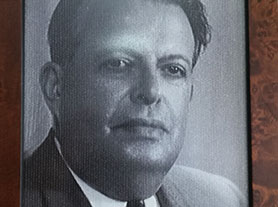
Boulos Halim Fayyad
Boulos Halim Fayyad was born in Beirut on 2 January 1901. He studied at the College des Freres in Beirut, and then began working in trade. In 1931, he founded the chain of stores “Boulos Halim Fayyad & Co.” He was ...
Read MoreBoulos Halim Fayyad was born in Beirut on 2 January 1901. He studied at the College des Freres in Beirut, and then began working in trade. In 1931, he founded the chain of stores “Boulos Halim Fayyad & Co.” He was a member of the Beirut International Club, the municipality of Beirut, and the Beirut stock exchange. In February 1951, he was appointed Minister of Justice, Minister of the National Economy, Minister of Health and Public Relief, and Minister of Agriculture in the government of Prime Minister Hussein Al Oueini, which oversaw the parliamentary elections of 1951. He signed the judicial agreement with the Syrian Minister of Justice in February 1951. He was appointed a member of the Social Recovery Administration Council board. He resigned from it in May 1960. He received the National Order of the Cedar, at the rank of Officer. He married Ms Marie Iskander Fayyad. Their children are Paula, Marie Jeanne, Halim, and Iskander. He passed away on 13 August 1990.
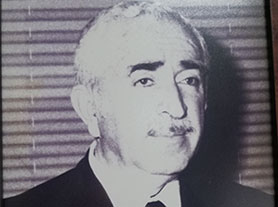
Rashid Abdel Hamid Karami
Rashid Abdel Hamid Karami’s family was from Tripoli, and he was born in Miriata on 30 December 1921. He studied at the College des Freres Schools, and in the College of Education in Tripoli. He then went to Egypt, where ...
Read MoreRashid Abdel Hamid Karami’s family was from Tripoli, and he was born in Miriata on 30 December 1921. He studied at the College des Freres Schools, and in the College of Education in Tripoli. He then went to Egypt, where he studied law, and earned his degree from Cairo University in 1948. There, he began working in the office of Fouad Rizk, before returning to open his own office. He was elected as a Member of Parliament from Tripoli in the elections of 1951, 1953, 1957, 1960, 1964, 1968, and 1972, and remained a Member of Parliament until his assassination, due to the laws extending the parliament’s mandate. In June 1951, he was appointed Minister of Justice in the government of Prime Minister Abdallah El Yafi, and in August 1953 he was appointed Minister of the National Economy and Social Affairs in the government of Prime Minister Abdallah El Yafi. He was also appointed Minister of the National Economy and Social Affairs in September 1954 in the government of Prime Minister Sami El Solh. He was again appointed Minister of the National Economy and Social Affairs in July 1955 in the government of Prime Minister Sami El Solh. Rashid Karami was appointed Prime Minister 12 times – in 1950, 1958 (twice), 1959, 1961, 1965, 1966, 1969 (twice), 1975, 1976, and 1984. When he was appointed Prime Minister for the first time in September 1950, he was the youngest Prime Minister in Lebanese history. During his time as Prime Minister, he headed a number of ministries, among them the Minister of Interior, the Ministry of Public Planning, the Ministry of National Defense, the Ministry of Finance, the Ministry of the National Economy, the Ministry of News, the Minister of Foreign Affairs and Displaced Persons, the Ministry of Information, the Ministry of Agriculture, and the Ministry of Housing and Cooperatives. During his time as Prime Minister, he led a number of official delegations to foreign countries, and participated in several Arab conferences and summits. He was one of the pillars of the Chehab era, and nominated Elias Sarkis for the presidency, taking a strong stand against Bachir Gemayel becoming president. He rejected the agreement of 17 May 1983. He participated in the meetings in Geneva in 1983, and in Lausanne in 1984, which established the national unity government, of which he became the Prime Minister. He was known as a statesman, a wise leader, and a moderate politician. He was also known for his austerity, his deep belief, his piety, his devotion to prayer, and his commitment to brotherly Muslim-Christian coexistence. He participated in several development projects, and was known for his concern for public funds. He followed the political and administrative reform that occurred under President Fouad Chehab, which he strongly supported. He was assassinated on 1 June 1987. He was returning to Beirut from Tripoli when a bomb that had been placed behind his seat on a Lebanese military helicopter exploded.
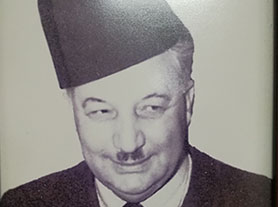
Riad Reda El Solh
Riad Reda El Solh’s family was from Sidon, and he was born in Tyre in1894. He studied at schools of several cities, from Al-Makassed School in Sidon, to the Antoura School in Keserwan, to Saint Joseph’s University. He studied law ...
Read MoreRiad Reda El Solh’s family was from Sidon, and he was born in Tyre in1894. He studied at schools of several cities, from Al-Makassed School in Sidon, to the Antoura School in Keserwan, to Saint Joseph’s University. He studied law in Astana, where he earned his degree. Early in his life, the military court sentenced him, along with his father, to exile, for their opposition to the Party of Union and Progress. He spent two years (1916-1918) in Anatolia. After World War I, he lived in Syria for a period, and joined the secret Young Arab Society, or Al-Fatat. In 1920, he traveled to Egypt, then from there to Europe, and participated in the effort to free Syria and Lebanon from the Mandate. He returned to Beirut in 1935, where he worked as a lawyer. He was elected as a Member of Parliament from the South Governorate in the elections of 1943, 1947, and 1951. He was appointed Prime Minister and Minister of Finance in September 1943. He was then appointed Prime Minister, Minister of Supply, and Minister of Interior in July 1944. He was appointed Prime Minister in December 1946, and again in June 1948. He was then appointed Prime Minister and Minister of Justice in July 1948. He was also appointed Prime Minister and Minister of National Education in October 1949. He then stepped down from the Ministry of Education and took over the Ministry of the Interior, after the cabinet reshuffle that occurred one week after the government was formed. He was famous for being one of the pillars of the National Pact, along with Bechara El Khoury, Sabri Hamadeh, and others. He helped to draft the Alexandria Protocol, which set the way for accord among the seven independent Arab states at that time. This was a prelude to the establishment of the Arab League in 1944. He married Ms Fayza Al Jabri. Their children are Lamia, Aliya, Bahija, Mona, and Leila. In his last term in the Ministry, Antoun Saadeh, the leader of the Syrian Social Nationalist Party, was executed. The nationalists held El Solh responsible for the execution. In July 1951, while returning from Amman, El Solh was fired upon and died in his car. He was transported to Beirut, and buried near the tomb of Al-Awza’i.
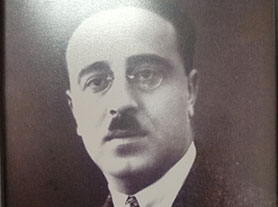
Selim Habib Takla
Selim Habib Takla was born in Zouk Mikael, Keserwan District in 1895. He studied at the Antoura school, graduating in 1911. He then studied law at the French Institute, where he earned his degree. He began working in administrative and ...
Read MoreSelim Habib Takla was born in Zouk Mikael, Keserwan District in 1895. He studied at the Antoura school, graduating in 1911. He then studied law at the French Institute, where he earned his degree. He began working in administrative and judicial positions. After World War I, he was appointed head clerk of the Justice Inspection Committee for the Alawite region, then appointed examiner in Beirut in 1922. In 1923, he was appointed administrative officer of the Beqaa District, and then appointed Governor of Beirut and Tripoli 1931. He was elected as a Member of Parliament from Mount Lebanon in the elections of 1937 and 1943. He was appointed Minister of Public Works in October 1937 in the government of Prime Minister Kheireddine Al-Ahdab. In March 1938, he was appointed Minister of Public Works, and made responsible for foreign affairs, in the government of Prime Minister Khaled Chehab. In September 1943, he was appointed Foreign Minister and Minister of Public Works in the government of Prime Minister Riad El Solh. Afterwards, in July 1944, he was appointed Foreign Minister and Minister of Public Works in the government of Prime Minister Riad El Solh. Finally, he was appointed Foreign Minister and Minister of Justice in January 1945 in the government of Prime Minister Abdul Hamid Karami. Selim Takla participated in making Lebanese independence a reality. He was arrested on 11 November 1943, and thrown in the Rashaya Citadel, along with Bechara El Khoury, Riad El Solh, Camille Chamoun, Adel Osseiran, and Abdul Hamid Karami. He was the focal point of political diplomacy at the beginning of the era of independence. He contributed to promoting openness among the Arab nations, as well as to the charter of the Arab League. He married Ms Rina Kashua. Their children are Youssef and Mona. He passed away on 11 January 1945, two days after he was appointed Minister. He was succeeded by his brother Philippe in the parliament, while Henri Philippe Pharaoun succeed him in the Ministry.
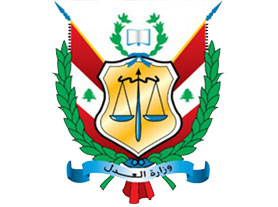
Henri Philippe Pharaoun
Henri Philippe Pharaoun was born in Alexandria, Egypt in 1898, and then moved with his father to Switzerland, where he studied at the Dominican Academy in Lausanne. He continued his university studies at the law school of the French city ...
Read MoreHenri Philippe Pharaoun was born in Alexandria, Egypt in 1898, and then moved with his father to Switzerland, where he studied at the Dominican Academy in Lausanne. He continued his university studies at the law school of the French city of Lyon. He completed his degree in 1922. In addition to Arabic, he was proficient in French, English, and German. He was the Head of the Beirut Port Company and its investments for more than 35 years. Likewise, he was the head of the board of directors of Bank Pharaoun and Chiha. He managed this bank with his brother-in-law, Michel Chiha. He participated in establishing a horse racetrack in Beirut, and was the head of the board of directors of this racetrack for half a century. He began his work in the political arena early in life, as he was appointed as a Member of Parliament from Beirut for the first time in 1929. Then, he withdrew from politics for a period, returning in 1943 when he was elected as a Member of Parliament from Beqaa. He was reelected from Beqaa in 1947, and then elected as a Member of Parliament from Beirut in 1951. He was the head of the Finance Committee. In January 1945, he was appointed Foreign Minister and Minister of Justice in the government of Prime Minister Abdul Hamid Karami, taking over for Selim Takla. Then, in December 1946, he has appointed Foreign Minister in the government of Prime Minister Riad El Solh. He was also appointed as a minister of state in February 1968 in the government of Prime Minister Abdallah El Yafi, but he resigned in April of that same year. Henri Pharaoun played an important role during the fight for independence in 1943. He was one the biggest supporters of independence, and participated in every stage of the struggle. He was one of the members of the provisional government led by Saeb Salam, with Kamal Jumblatt and others among its members. He proposed the law, voted upon by the parliament in the 31 March 1944 session that revoked President Émille Eddé’s membership in parliament. He was known for his loyalty to the Constitutional Bloc, and to its head Bechara El Khoury, but he would later oppose El Khoury’s renewal as president. He was also known for his support of the National Pact. He represented Lebanon in the sub-committees that drafted the charter of the Arab League in 1944. He married Ms Noyelle Kassar. They had one son, Naji. He passed away on 6 August 1993.
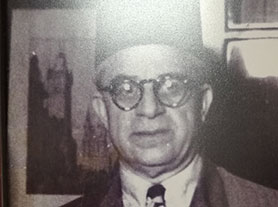
Saadi Al Munla
Saadi Al Munla was born in Tripoli in 1890, and where he began his studies. He traveled to Istanbul in 1911, and studied law in its university. In 1916, Jamal Pasha imprisoned him, along with Shukri Al-Quwatli and Fares Al-Khoury, ...
Read MoreSaadi Al Munla was born in Tripoli in 1890, and where he began his studies. He traveled to Istanbul in 1911, and studied law in its university. In 1916, Jamal Pasha imprisoned him, along with Shukri Al-Quwatli and Fares Al-Khoury, for period of one and a half years after they were tried in the military court in Aley. King Faisal appointed him the administrative official of Hama in 1920. He was elected as a Member of Parliament from the North Governorate in the first independent parliament in 1943. He was reelected in 1951 from Tripoli. He participated in the work of the parliamentary committees, and was a member of the following committees: Budget and Finance; Trade, Agriculture, and Supply; Public Works; and Post and Telegraph. He was also elected for a period of time as head of the National Economy Committee and the Trade, Agriculture, and Supply Committee. He was known for his enthusiasm for amending the constitution and freeing its articles from the binds of the French Mandate. He was also known for his courage in taking stands in support of independence. He tried to forcibly enter the parliamentary building on the morning of 11 November through one of the windows after the French military closed the main door, endangering his life. The window that he entered through is now called “Saadi Al Munla’s window.” In this famous session, in which a quorum was not reached, the six members of parliament and their speaker Sabri Hamadeh designed the Lebanese Flag. Saadi Al Munla drew it in pencil, and colored it rudimentarily with a red pen. In August 1945, he was appointed Minister of Justice in the government of Prime Minister Sami El Solh. Then, in May 1946, he was appointed Prime Minister and Minister of the National Economy under President Bechara El Khoury. He passed away on 12 September 1973.
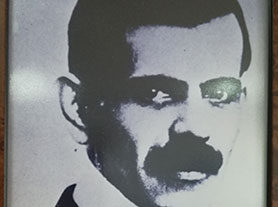
Ayoub Jirjis Tabet
Ayoub Jirjis Tabet was born in Bhamdoun El-Day’aa in 1874. He studied there in various local schools. Then he moved to Beirut, where he studied in the Syrian Evangelical School. He graduated as a doctor in 1893. Afterwards, he traveled ...
Read MoreAyoub Jirjis Tabet was born in Bhamdoun El-Day’aa in 1874. He studied there in various local schools. Then he moved to Beirut, where he studied in the Syrian Evangelical School. He graduated as a doctor in 1893. Afterwards, he traveled to the United States, and became an internal medicine specialist in 1905. He worked in one of New York’s hospitals. Then, he returned to Lebanon to practice medicine in his home country. He traveled to France in 1913 and participated in the first Arab Congress. At that time, he had secret contacts with the French, the most famous of which was the letter that he sent in March 1913 to Couget, the Consul-General of France in Damascus, in which he requested a French guarantee of independence for the Ottoman province of Beirut. On 14 May 1922, the Governor of Greater Lebanon, Trabaud, appointed him as a member from Beirut, representing the minorities, in the first Representative Council. Then, he was appointed as a member of the Senate on 24 May 1926. After the Senate was disbanded in 1927, and its members joined the parliament, Ayoub Tabet became a Member of Parliament and remained in parliament until 1929. In 1926, Ayoub Tabet wrote a draft of a non-sectarian constitution, which was not adopted. He was civic-minded and hated sectarianism. Appropriately, in the 1932 census, when asked for his religious affiliation he wrote “non-sectarian.” In 1934, he was elected as a Member of Parliament for the minority seat in Beirut. Likewise, in 1937 he was appointed as a Member of Parliament representing the minorities. In the 1943 elections, he was elected for the final time, and remained in parliament until he passed away. He was appointed Minister of Interior and Minister of Health and Public Relief in January 1928 in the government of Prime Minister Bechara El Khoury. In 1936, he was appointed as a secretary of state under President Émile Eddé. He remained in this position until 4 January 1937. In March 1943, the French High Commissioner Catroux appointed him president of the Lebanese state, as well as Prime Minister. Catroux also appointed him Minister of Interior, Minister of Justice, and Minister of Supply. Ayoub Tabet worked to restructure the state, and he did not accept any violation of the law. He accomplished a great deal in the field of judicial reform. Likewise, he reorganized the security forces and the Ministry of Resources, and also corrected the salaries of those working in public service. He passed away, a bachelor, on 14 February 1947. A bronze statue of him was erected in Bhamdoun El-Day’aa.
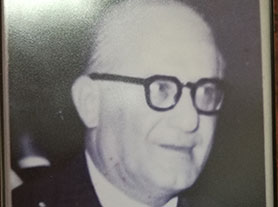
Habib Abu Shahla
Habib Abu Shahla’s family was from the town of Mimess in the Hasbaya District, and he was born in Beirut in 1902. He studied in the English School, then in the American University, where he earned his Bachelors in Science. ...
Read MoreHabib Abu Shahla’s family was from the town of Mimess in the Hasbaya District, and he was born in Beirut in 1902. He studied in the English School, then in the American University, where he earned his Bachelors in Science. He then traveled to France and studied law at the Sorbonne. He earned his doctorate in law in 1924, and began working in Paris. He returned to Beirut and opened a law office in 1925. In 1928, he was elected as a member of the Beirut Municipality Council, and remained a member of the council for 3 years. He was elected a Member of Parliament from Beirut in the elections of 1937, 1943, 1947, and 1951, and was a member of several parliamentary committees. In January 1937, he was appointed Minister of Education, Minister of Health and Relief, and Minister of Tourism in the government of Prime Minister Kheireddin Al Ahdab. Likewise, in March 1937, he was appointed Minister of National Education, Minster of Health and Public Relief, and Minister of the National Economy in the government of Prime Minister Kheireddin Al Ahdab. Then, he was appointed Minister of Interior in July 1937, but resigned in December 1938. In January 1939, he was reappointed as Minister of Interior, and also charged with the responsibility for the Ministry of Defense and the Foreign Ministry in the government of Prime Minister Abdallah El Yafi. He was also appointed Minister of Justice and Minister of National Education in September 1943 in the government of Prime Minister Riad El Solh. In July 1944, he was appointed Minister of Justice and Minister of National Education. In both of these governments, he was also appointed Deputy Prime Minister. He filled the office of the President from 11 November 1943 through 22 November 1943, when the French imprisoned Bechara El Khoury and Riad El Solh in the Rashaya Citadel. Likewise, he carried out the duties of the President and the Prime Minister during the battle for independence. He was appointed Prime Minister twice in 1944, and was elected speaker of parliament in 1946. He participated in a number of symposiums and lectures, and was known for his eloquence and his knowledge of literature. He received several honors, both Lebanese and foreign. He passed away, a bachelor, on 22 March 1957. A full statue of him was erected in Beirut near UNESCO Square.
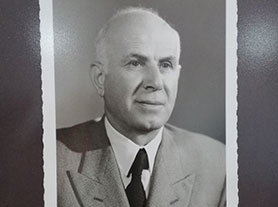
Phillippe Najib Boulos
Phillippe Najib Boulos was born in Kafr Aka (Koura District) in 1902. He studied at the American school until secondary school, and then studied law at the Jesuit University, where he earned his degree in 1923. He was first appointed ...
Read MorePhillippe Najib Boulos was born in Kafr Aka (Koura District) in 1902. He studied at the American school until secondary school, and then studied law at the Jesuit University, where he earned his degree in 1923. He was first appointed as a judge in 1923. He became a member of the Court of Appeals, and then became its head. He participated in drafting the Penal Code that was issued in 1933. He continued as a judge until 1947, when he resigned to work as a lawyer. However, in 1941, he was appointed outside of the judiciary as undersecretary to the secretary of state for National Education and Youth (pursuant to Decree No. 16, issued on 25 April 1941). In 1960, he was appointed Governor of the city of Beirut. He was also a member of the International Commission of Jurists in Geneva. In December 1941, he was appointed Deputy Prime Minister and Minister of Justice in the government of Prime Minister Ahmad Daouk. Then, in July 1942, he was appointed Minister of Public Works and Minister of Foreign Affairs in the government of Prime Minister Sami El Solh. He was also appointed Minister of Public Works and deputy Prime Minister in June 1951 in the government of Prime Minister Abdallah El Yafi. After that, in May 1961, he was appointed Minister of Justice, Minister of the National Economy, and Minister of Tourism, as well as deputy Prime Minister, in the government of Saeb Salam. He was also appointed Minister of Guidance and News, as well as deputy Prime Minister in the government of Prime Minister Rashid Karami in October 1961. He was elected as a Member of Parliament from the North Governorate in 1951. He was reelected in 1960 and 1964 as a Member of Parliament from the Koura District. He participated in the work of the parliamentary committees, and was a member of the Finance and Budget Committee, the Administration and Justice Committee, the News Committee, and the Rules of Procedure Committee. He was also elected deputy speaker of parliament in 1952. During his time in government, the National News Agency was established and Lebanese broadcasting was strengthened. He married Ms Julie Tamer. Their children are Najib, May, Samia, and Nadine. He passed away on 11 November 1979.
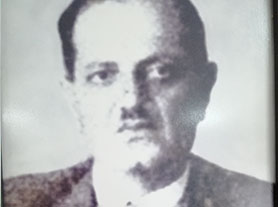
Khaled Najib Chehab
Khaled Najib Chehab was born in Hasbaya in 1890. He completed his early studies in Hasbaya’s schools, and then earned a diploma from the Al-Rashidiya School in Safed, Palestine. He moved to Damascus to continue his studies in the Catholic ...
Read MoreKhaled Najib Chehab was born in Hasbaya in 1890. He completed his early studies in Hasbaya’s schools, and then earned a diploma from the Al-Rashidiya School in Safed, Palestine. He moved to Damascus to continue his studies in the Catholic Patriarchate School. He participated with the Lebanese delegation in the signing of the Franco-Lebanese Treaty in 1936. He was appointed Governor of the North Governorate in 1943, then appointed as the Lebanese ambassador to Jordan. He was elected as a representative of the South Governorate in the first Representative Council in 1922, and was elected again in 1925. Similarly, he was elected as a Member of Parliament from the South Governorate in the cycles of 1929, 1934, 1937, and 1960. He was appointed Minister of Finance in May 1927 in the government of Prime Minister Bechara El Khoury. He was then appointed Prime Minister and Minister of Justice in March 1938 under President Émile Eddé. Likewise, he was appointed Prime Minister, Minister of Interior, Minister of Justice, Minister of News, and Minister of National Defense in September 1952 under President Camille Chamoun He was elected Speaker of Parliament from 1935-1936 during the period of the French Mandate. He received several honors from Lebanon, Jordan, and Uruguay. He married Ms Emira Sareyah Chehab. Their children are Lamiss (the wife of Emir Majid Arsalan), Wasima, Suhail, and Najib. He passed away on 7 July 1978.
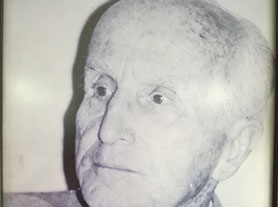
Abdallah Aref El Yafi
Abdallah Aref El Yafi was born in Beirut in 1901. He studied at the Ottoman College, and then moved to the Jesuits’ law institute, where he earned his law degree in 1923. He traveled to Paris and earned a ...
Read MoreAbdallah Aref El Yafi was born in Beirut in 1901. He studied at the Ottoman College, and then moved to the Jesuits’ law institute, where he earned his law degree in 1923. He traveled to Paris and earned a doctoral degree in law from the Sorbonne University in 1926. He was the first Muslim from the Middle East to earn this degree. He returned to Beirut to practice law as well as politics, and was elected Secretary of the Bar Association. He was elected as a Member of Parliament from Beirut in 1937, and was reelected in the elections of 1943, 1947, 1951, 1953, and 1968 in the Beirut III district. He was the Head of the Administration and Justice Committee for a number of years, as well as Head of the Foreign Affairs Committee. He was appointed Prime Minister and Minister of Justice in November 1938, and also in January 1939. He was appointed Minister of Justice in the government of Prime Minister Riad El Solh in December 1946. Likewise, he was appointed Prime Minister and Minister of Interior in June 1951 and in August 1953, in addition to taking on the national defense and news portfolios. Afterwards, he was appointed Prime Minister, Minister of Finance, and Minister of News in March 1954, then Prime Minister and Minister of Interior in March 1956. He was then appointed Prime Minister, Minister of Interior, and Minister of Public Planning in June 1956. He was also appointed Prime Minister, Minister of Finance, and Minister of News in April 1966. In October 1968, he was appointed Prime Minister, Minister of Interior, and Minister of National Education and Fine Arts, but the government did not appear before the parliament. He was reappointed Prime Minister, Minister of Finance, Minister of National Education and Fine Arts, and Minister of Labor and Social Affairs in October 1968. Abdallah El Yafi was known for his moderate positions. He was one of the signers of the United Nations Charter in New York. Likewise, he headed the parliamentary delegation to Helsinki. He resisted cronyism in politics and carried out a number of reform projects. He received several honors from Lebanon, Egypt, Syria, Italy, Brazil, Columbia, and other countries. He married Ms Hind El Azm. Their children are Ghada, Nahila, Aref, Wa’ek, and Ghiath. He passed away on 4 November 1986.
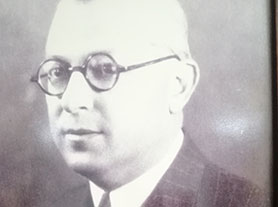
Kheireddine Said El Ahdab
Kheireddine Said El Ahdab’s family hails from Tripoli. He was born in Beirut in 1894. He studied in the College des Freres, then traveled to France to study math at the Sorbonne University. He returned to Lebanon to work in ...
Read MoreKheireddine Said El Ahdab’s family hails from Tripoli. He was born in Beirut in 1894. He studied in the College des Freres, then traveled to France to study math at the Sorbonne University. He returned to Lebanon to work in the High Commission, which was then part of the French Mandate. However, he soon began working in journalism, and, in 1925, he established the newspaper al-Ahd al-Jadid, as well as the journal Pan-Arab. He was elected as a Member of Parliament from Beirut in 1934, and then was appointed as a Member of Parliament from the North Governorate in 1937. He was also a member of the Finance Committee and rapporteur of the Public Works and Education Committee. Under President Émile Eddé, he was appointed Prime Minister, Minister of Justice, and Minister of Interior in January 1937. He was then appointed Prime Minister, Minister of Finance, Minister of Justice, and Minster of Post and Telegraph in March 1937. Then, in July 1937, he was named Prime Minister, Minister of Justice, and Minister of the National Economy. Likewise, he was appointed Prime Minister, Minister of Justice, and Foreign Minister in October 1937. Finally, he was appointed Prime Minister and Minister of Justice in 1938. He married Ms Olga Muslim. Their children are Walid and Aida. He passed away in Marseille, France in 1941, and was buried there due to the war. His remains were repatriated to Lebanon in 1947. The municipality of Beirut named one of the streets in the capital after him.
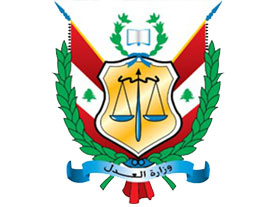
Sami Khalil El Khoury
Sami Khalil El Khoury was born in Rechmaya, Aley District, on 25 August 1896. He completed his primary and secondary education at the Pères Jésuites School, and then studied law at the Jesuit University, where he earned his degree. In ...
Read MoreSami Khalil El Khoury was born in Rechmaya, Aley District, on 25 August 1896. He completed his primary and secondary education at the Pères Jésuites School, and then studied law at the Jesuit University, where he earned his degree. In 1920 he was appointed as a translator in the Court of Cassation’s public prosecution office. In 1921, he became an adjunct member of the Beirut Court of First Instance. In May 1926, he was promoted to General Director of Justice, and he remained in this position until 1938, On 9 May 1932, the High Commissioner Henri Ponsot issued Resolution 56 L.R., which gave the Council of General Directors the powers of ministers. This occurred under the government of directors that was headed by Charles Debbas. At the time, Sami El Khoury was Director of Justice. He was then he was appointed Minister of Justice under the government of directors led by Abdallah Beyhum. He moved to the Foreign Service in 1943 and was appointed Minister-Counselor of Lebanon in Egypt and Abyssinia, then Minister-Counselor in Belgium, then in the Netherlands and Luxemburg. Likewise, he was appointed as the Lebanese Ambassador to Spain from 1955 to 1960. He received a number of honors, the most prominent of which were from Lebanon, Egypt, Jordan, Albania, Holland, Luxemburg, and Spain. He married Ms Evelyn Katibini. Their children are Samir, Rafic, and Munir. He passed away on 11 May 1957.
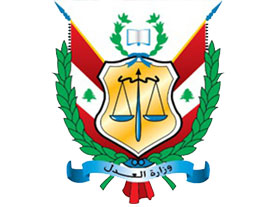
Auguste Pacha Ibrahim Adib
Auguste Pacha Ibrahim Adib belongs to the Nehme family from Deir Al-Qamar. He was born in Astana, where his father worked in trade, on 2 August 1859. Then, his father took him back to Lebanon and enrolled him in the ...
Read MoreAuguste Pacha Ibrahim Adib belongs to the Nehme family from Deir Al-Qamar. He was born in Astana, where his father worked in trade, on 2 August 1859. Then, his father took him back to Lebanon and enrolled him in the Pères Jésuites School in the town of Ghazir in the Keserwan District. Afterwards, he enrolled in the Jesuit University in Beirut following its founding in 1875. He migrated to Egypt and was appointed as an engineer in the survey office. After three years, he moved to the State Financial Administration. The Egyptian government gave him the title “Pasha” and sent him to London and Paris to study accounting. He continued to serve the Egyptian government for 35 years, after which he retired. After Greater Lebanon was established in 1920, he was appointed Director of the Ministry of Finance, then Secretary-General of the state. In 1926, he formed the first cabinet after the establishment of the Lebanese Republic. He was appointed Prime Minister, Minister of Finance, and head of the State Shura Council in May 1926, making him the first Prime Minister in the history of Lebanon. He was also appointed Prime Minister, Minister of Finance, and Minister of Agriculture in March 1930. After the resignation of Ahmed Al Husseini from the Ministry of Justice in July 1931, Auguste Adib was appointed in his place. He represented Lebanon in the successive international conferences held in Lausanne, Istanbul, Paris, London, and Geneva to review the issue of the “public debt” of the Ottoman Empire, and how it should be distributed among the countries that had previously been a part of the sultanate. He was responsible for Lebanon being freed of the burden of this debt, on the basis that it had been administratively, judicially, and financially independent of the Ottoman Empire. For his work in Egypt, he received several honors. He wrote a number of books and articles, the most important of which is Lebanon After the War. He also compiled a collection of memos and reports on budgets and state finances in Egypt and Lebanon. He married Ms Rose Khayat. Their children are Michel, who died in childhood, and three girls: Gabrielle, Elise, and Berthe. He passed away in Paris in a hotel fire on 19 July 1936.
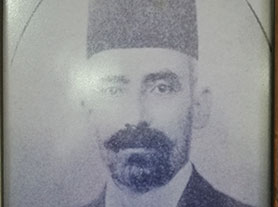
Ahmed Moustafa Al Husseini
Al Husseini was born in Mazraat Al-Sayaad in Jbeil in 1881. He entered the preparatory school in Beirut, where he studied Arabic and Turkish and their literatures. Then, he studied doctrine under Charbel Tahoumi. Afterwards, he was appointed Director of ...
Read MoreAl Husseini was born in Mazraat Al-Sayaad in Jbeil in 1881. He entered the preparatory school in Beirut, where he studied Arabic and Turkish and their literatures. Then, he studied doctrine under Charbel Tahoumi. Afterwards, he was appointed Director of Shmustar, a town located in the Mount Lebanon Governorate. He resigned the following year. In 1922, he was elected from Beqaa as a member of the first Representative Council, and served as the Secretary of that council for a year. He was then elected as a Member of Parliament from Mount Lebanon in 1929, 1937, 1943, 1947, and 1951. He was also the head of the following committees: Public Works, Public Health, and Administration and Justice. He was a member of several other committees as well. He was appointed Minister of Justice in four governments. The first time was in March 1930 in the government of Prime Minister Auguste Pacha Adib. He resigned in July 1931 for health reasons. Then, in July 1942, he was appointed Minister of Justice and Minister of Agriculture in the government of Prime Minister Sami El Solh. He was appointed Minister of Justice for a third time in May 1946 in the government of Prime Minister Saadi Al Munla, and for the fourth time in June 1947 in Prime Minister Riad El Solh’s government. He was also appointed Minister of Public Works (May 1927), Minister of Agriculture (October 1929), Minister of Public Works and Agriculture (March 1937), Minister of Interior (December 1929), and Minister of Public Works (February 1952). During his membership in the Representative Council, he was appointed as a judicial investigator to investigate the strikes that were taking place in Chouf. He married Ms Sakineh Al Husseini. Their children are Moustafa and Ali. He passed away on 28 November 1963.
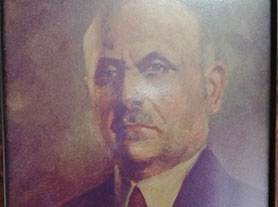
Bechara Khalil El Khoury
Bechara Khalil El Khoury’s family hails from Rechmaya (Aley District), and he was born in Beirut on 10 August 1890. He studied in Beiteddine, then in Baabda, and completed his studies at the Pères Jésuites school in Beirut. He then ...
Read MoreBechara Khalil El Khoury’s family hails from Rechmaya (Aley District), and he was born in Beirut on 10 August 1890. He studied in Beiteddine, then in Baabda, and completed his studies at the Pères Jésuites school in Beirut. He then studied law in Paris, where he earned his degree. He returned to Lebanon in 1912 to practice law in the office of Émile Eddé. He traveled to Egypt in 1914 and practiced law. He then returned to Beirut in 1919 and was elected president of the Bar Association in 1930. After this, he became a judge and was appointed head of the Court of Appeals. He was appointed to the Senate in 1926, then was reappointed as a Member of Parliament in 1929, 1934, and 1937, and won in the elections of 1943. He was appointed Minister of Interior in May 1926 in the government of Auguste Adid, then as Prime Minister and Minister of Education in May 1927. In May 1928, he was appointed Prime Minister, Minister of Justice, and Minster of Public Education. He was a member of the Lebanese delegation that participated in the signing of the Franco-Lebanese Treaty in 1936. Bechara El Khoury was one of the leaders of the pen-Arab movement, and was a proponent of Arab cooperation. He maintained strong relationship with Riad El Solh. Together, they drafted the National Pact, relying on the principles “no east and no west,” no isolation, no integration, but an accord based on a consensus among the Lebanese people, with complete independence from, but cooperation with Arab nations. He was elected President of the republic on 21 September 1943. He married Ms Laure Shiha, and their children are Khalil, Michel, and Huguette. He passed away on 11 January 1964. A large state funeral was held for him.
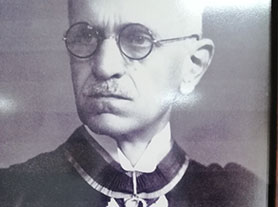
Najib Matia Abu Sawan
Najib Matia Abu Sawan was born in Jerusalem in 1875. He studied at the College des Freres in Jerusalem. Then, he studied law in Istanbul and worked as an attorney. In 1914, Jamal Pasha exiled him to Beirut, where he ...
Read MoreNajib Matia Abu Sawan was born in Jerusalem in 1875. He studied at the College des Freres in Jerusalem. Then, he studied law in Istanbul and worked as an attorney. In 1914, Jamal Pasha exiled him to Beirut, where he lived under house arrest. He was appointed as the Head of the Court of Appeals in 1918, and as an administrative official for the city of Beirut in 1920. He was then appointed Head of the Supreme Judicial Council for the Court of Cassation. He was the first Head of this court. He was appointed Minister of Justice under three governments. The first was the government of Habib Pacha El Saad on 10 August 1928. He resigned after three days and Choucri Cardahi was appointed in his place. The second time was in the government of Bechara El Khoury in May 1929, and the third time was in the government of Émile Eddé in October 1929. After the Conference of Lausanne in 1920, he was charged with drafting the legislation for the territories that fell within the French Mandate. In 1925, he headed some of the sessions of the committee charged with drafting the Lebanese constitution. He received a number of honors, the most prominent of which are the French Legion of Honor and the Lebanese Order of Merit. He married Ms Laure Larry. Their children are Camille and Samia. He passed away on 16 June 1950.
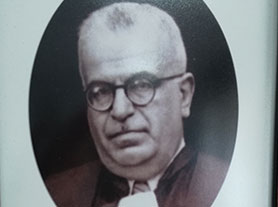
Choucri Boutros Cardahi
Choucri Boutros Cardahi’s family is from Deir Al-Qamr, and he was born in Beirut on 7 April 1890. He received his education at Saint Joseph School. He then studied law at Aix-Marseille University, graduating in 1910. Afterwards, he moved to ...
Read MoreChoucri Boutros Cardahi’s family is from Deir Al-Qamr, and he was born in Beirut on 7 April 1890. He received his education at Saint Joseph School. He then studied law at Aix-Marseille University, graduating in 1910. Afterwards, he moved to Egypt to practice law at the Mixed Courts (1911-1920). Then, he returned to work in Beirut. He taught law at the French Law College from 1920 until 1960, when he became a professor emeritus. He was appointed a member of the Court of Cassation in 1922. He traveled to The Hague, and taught at the Academy of International Law. In 1944, he was chosen to be the Doctor of Honor in the University of Algiers. In 1955, he was appointed as an expert in the International Labour Organization. He was appointed Minister of Justice twice under President Charles Debbas, the first time in May 1927 in Prime Minister Bechara El Khoury’s government, and the second time in August 1928 in the government of Prime Minister Habib Pacha Es-Saad after Najib Abu Sawan resigned. He wrote several legal pieces and articles, and received many honors. He passed away as a bachelor on 8 July 1973.
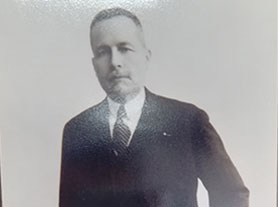
Najib Abdel Kader Kabbani
Najib Abdel Kader Kabbani was born in Beirut in 1870. He studied at the school of Sheikh Abbas Al-Azhari in Beirut. He then studied law at the Damascus Institute, where he earned his degree. Afterwards, he moved to Istanbul where ...
Read MoreNajib Abdel Kader Kabbani was born in Beirut in 1870. He studied at the school of Sheikh Abbas Al-Azhari in Beirut. He then studied law at the Damascus Institute, where he earned his degree. Afterwards, he moved to Istanbul where he earned his doctorate in law. His was the first to obtain a law degree in Lebanon and was granted the title “Bey.” He began his career as a judge. In 1918, he was appointed to the Court of Cassation in Damascus. Following this, he moved to Palestine. He returned to Beirut, where he was appointed to several judiciary positions. He was the Attorney-General in the Court of Appeals, and a member of the High Court of Cassation. He was appointed Minister of Justice under President Charles Debbas, in the government of Prime Minister Auguste Adib, in May 1926. He was the first Sunni minister. He was awarded the National Order of the Cedar at the level of Commander. He married Ms Naamat Rashid. Their children are: Najati, Ismail, Aliya, and Afat. He passed away on 14 January 1947.
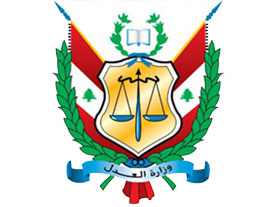
Charles Debbas
Charles Debbas was the first person in Lebanon to hold the position of Minister of Justice. He was born in Damascus on 16 April 1884. He studied at Thathalat Aqmar School, then in Saint Joseph University and the American University. ...
Read MoreCharles Debbas was the first person in Lebanon to hold the position of Minister of Justice. He was born in Damascus on 16 April 1884. He studied at Thathalat Aqmar School, then in Saint Joseph University and the American University. He studied law at the University of Montpellier, where he earned his diploma, and then his doctoral degree. He worked as a lawyer in Cairo, Paris, Astana, and Beirut. He also worked in journalism. He became the editor of the French-language newspaper La Liberté, and founded the French-language newspaper La Déclaration. During the French Mandate period, High Commissioner General Gouraud appointed him as the Head of the Department of Justice, Property, and Endowments in the Lebanese administration, according to Decree 343 dated 1/9/1920. He was then appointed Director of the Justice Department for the second time on 23/5/1922 by an administrative order issued by Trabaud, the Governor of Greater Lebanon. In December 1925, the High Commission selected him, along with Legal Advisor Souchier, to support the work of the parliamentary committee charged with drafting the Lebanese constitution. Charles Debbas remained Director of the Department of Justice until May 1926. As such, he was responsible for organizing the courts and the Bar Association. He also introduced the baccalaureate into the education system. He was elected President of the Lebanese Republic by the Representative Council and the Senate in a joint parliamentary session on 26 May 1926. He was in office for more than 7 years (1926-1933). He died as a bachelor in Paris on 22 August 1935.
General Directors
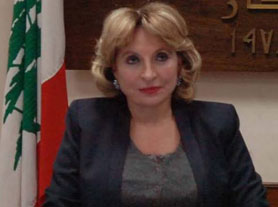
Mayssam Al Noueiry
Mayssam Al Noueiri is the first woman to hold the position of Director-General of the Ministry of Justice. She holds the following degrees: A diploma in French and Lebanese law from Saint Joseph University, 1971 An MA degree in political science from the ...
Read MoreMayssam Al Noueiri is the first woman to hold the position of Director-General of the Ministry of Justice. She holds the following degrees: A diploma in French and Lebanese law from Saint Joseph University, 1971 An MA degree in political science from the American University, 1972 A diploma in comparative law from the French Institute for Comparative Law, 1974 A graduate diploma in law from Saint Joseph University, 1979 A diploma in Spanish language from the Instituto Cervantes de Beirut, 1982 A diploma in German language from the Goethe-Institute Lebanon, 1984 She is fluent in Arabic, French, English, Spanish, and German. After graduating, she practiced law from 1972 to 1976. She joined the judicial staff in 1976, and progressed through several judicial positions. She was a consultant for the Court of Appeals for the chamber hearing commercial cases in Beirut (1981-2000), then the acting President of the Court of Appeals for the chamber hearing commercial cases in Beirut (2000-2003), and then president of the ninth chamber of the Court of Appeals in Beirut (2003-2014). On 19 May 2014, she was appointed Director-General of the Ministry by virtue of Decree No. 11594. Since 2008, she also teaches at the university level; she is a lecturer in the subject of commercial law at the Lebanese University and at Saint Joseph University. She also teaches a preparatory course for the entrance exam to the Judicial Studies Institute. She is a founding member of the Arab Women’s Legal Network, a regional association established in Amman in 2005, and was a member of its Board of Directors until 2009. She was also a member of the International Association of Women Judges from 2005 to 2010, and was a founding member of the Lebanese League for Women in Business. She has published numerous legal and judicial studies in Arabic, French, and English in specialised journals.
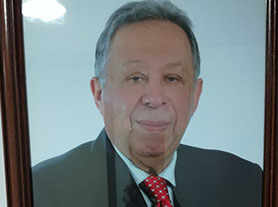
Omar Natour
Omar Natour was born in Beirut on 30/11/1945. He received his education at the International College (I.C.), and graduated in 1966. He obtained an LL.B. in Lebanese law from Saint Joseph University in Beirut in 1972 and an LL.B. in French ...
Read MoreOmar Natour was born in Beirut on 30/11/1945. He received his education at the International College (I.C.), and graduated in 1966. He obtained an LL.B. in Lebanese law from Saint Joseph University in Beirut in 1972 and an LL.B. in French Law from the University of Lyon—France in 1972. He also obtained a graduate degree in law from the University of Paris X Nanterre in 1979. In 1973, he joined the Lebanese judicial, and progressed through several judicial positions. He also served as legal advisor to the Director-General of the Arab Labour Organisation in Cairo, which is affiliated with the Arab League. He taught at the university level; between 1979 and 1995 he was a lecturer at the Lebanese University in the subjects of “Law and Petroleum Organisations” (taught in French), and introduction to legal studies (taught in French). Since 1995, he has also been a lecturer at the Faculty of Business Administration at Saint Joseph University in Beirut, in the subject of labour law and Lebanese Social Security (in Arabic). He was a judge attached to the Ministry of Justice and a delegate of the government in the Military Court when he was appointed as Director-General of the Ministry of Justice on 15/3/2000, by virtue of Decree No. 2643. On 30 November 2013, he finished his service at retirement age, by virtue of Decree No. 10663, dated 9/9/2013. He is fluent in Arabic, French, and English. Omar Natour married Rabab Suleiman, and has two children: Mohamed and Farida.
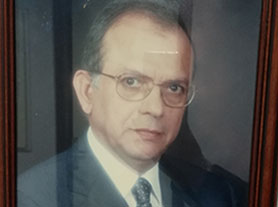
Selim Al Lazki
Selim Al Lazki was born in Beirut on 14/5/1944. He was appointed to the staff of the Courts of Justice and occupied several legal positions. He was head of chamber at the Court of Appeal in Mount Lebanon when he was ...
Read MoreSelim Al Lazki was born in Beirut on 14/5/1944. He was appointed to the staff of the Courts of Justice and occupied several legal positions. He was head of chamber at the Court of Appeal in Mount Lebanon when he was appointed Director-General of the Ministry of Justice on 28/12/1999, by virtue of Decree No. 1976. He was transferred from the judicial staff to the administrative staff, and appointed as Director-General of the Prime Minister’s Office, and by virtue of his position, as Secretary General of the Council of Ministers (by virtue of Decree No. 2599, dated March 10, 2000). In 2000, he also was appointed as a member representing the state of Lebanon on the Agency for Liquidating Expropriated Banks, which replaced the board of the “Bank Management Division” of the Agricultural, Industrial, and Real Estate Credit Bank on August 14, 2000. Selim Al-Ladhiqi’s service in the administration was terminated at his request on 10 November 2000.
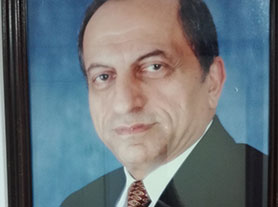
Wajih Khater
Wajih Khater was born in Beirut, studied at Al-Makassed School, and went to Damascus to study law. He received a Bachelor’s degree, and then his doctoral degree in law in 1971 from the Law School at the University of Damascus. He ...
Read MoreWajih Khater was born in Beirut, studied at Al-Makassed School, and went to Damascus to study law. He received a Bachelor’s degree, and then his doctoral degree in law in 1971 from the Law School at the University of Damascus. He was delegated to the staff of the judiciary in September 1965 (Decree No. 2511, dated 8/9/1965). In May 1972, he was appointed Chairman of the Committee on Objections to Income Tax in Mount Lebanon. In 1973, he was appointed as an investigating judge in Mount Lebanon. He was appointed as Acting Director-General of the Ministry of Justice (by virtue of Decree No. 401, dated 31/3/1983). His was officially appointed as Director-General of the Ministry of Justice on 10/11/1983, on the basis of Article 36 of Legislative Decree No. 83/151 (the organisation of the Ministry of Justice), by virtue of Decree No. 1180, dated 6/12/1983. During his tenure at the General Directorate of the Ministry of Justice, he was appointed to the Higher Banking Commission of the Bank of Lebanon, a position he held until his death. He taught law at the Lebanese University, and was appointed a member in the Arab Center for Legal and Judicial Research. He published many studies, pieces of research, and writing, particularly in the journals al-‘Adl and Dirasat Lubnaniyya. He married Ms Wafeya Marai, and had four children: Hossam, Mohammed, Lina, and Danya. Wajih Khater died on 26 January 1999.
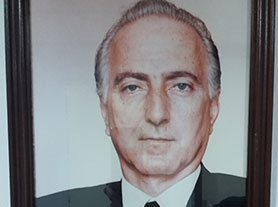
Hasan Refaat
Hasan Refaat received his primary and secondary education at the Jesuit Fathers’ School in Beirut, and he received a French and Lebanese baccalauréat. He received a general certificate in French literature and a certificate in Latin studies from the University of ...
Read MoreHasan Refaat received his primary and secondary education at the Jesuit Fathers’ School in Beirut, and he received a French and Lebanese baccalauréat. He received a general certificate in French literature and a certificate in Latin studies from the University of Lyon, France. He received an LL.B. in Lebanese law, and a LL.B. in French law from the University of Lyon. He also received a graduate degree in economics and public law. He received his doctoral degree in law from the University of Lyon. Since 1965 he has taught at the university level: at the law schools at Saint Joseph University and the Lebanese University, and at the Institute of Social Sciences. He was appointed as a judge on the State Shura Council, appointed as a member of the Cases Authority at the Ministry of Justice, and on the Legislation and Advisement Authority at the Ministry of Justice. On 1 January 1977, he was appointed Director-General of the Ministry of Justice (by virtue of Decree No. 9, dated 1/1/1977). He was temporarily delegated to the position of Head of the Central Inspection Agency (by virtue of Decree No. 161, dated 18/1/1983). He returned to practicing law after resigning from the public sector in 1987. He currently works as a legal consultant for a number of banks and financial groups. He is a registered arbitrator with the Arbitration Centre in Lebanon, and is on the list of arbitrators in Abu Dhabi and the Gulf Cooperation Council. He has participated in many conferences about human rights, in the Arab region and other countries. He has published many books and legal studies in various fields of law. He has been awarded the National Order of the Cedar with the rank of Grand Officer, and the French Legion of Honour with the rank of Officer.
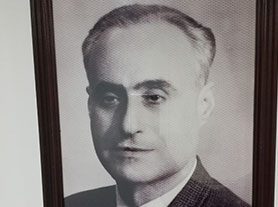
Elias Zakaria
He was born in Hamat in North Lebanon in 1911. He began his professional life at the Department of Agricultural Publications of the Ministry of Agriculture, also working as a trainer at the Institute of Agricultural Secondary Education. At the age of ...
Read MoreHe was born in Hamat in North Lebanon in 1911. He began his professional life at the Department of Agricultural Publications of the Ministry of Agriculture, also working as a trainer at the Institute of Agricultural Secondary Education. At the age of 48, he was seconded to complete his specialisation in political and administrative science at St. Joseph’s University in Beirut, later completing his doctorate in literature at the Sorbonne in Paris. He was awarded the National Order of the Cedar at the rank of Knight, by virtue of Decree No. 2307/OC dated 26 June 1959. He was appointed Director-General of the State Employees Cooperative on 18/3/1971, by virtue of Decree No. 830. He was also appointed in this capacity as an original member representing the Cooperative of Employees in the board of directors of CNSS on 13/1/1972 (by virtue of Decree No. 2654). In 1974, he was director-general of investment in the Ministry of Water and Electricity Resources, when he was transferred to the Ministry of Justice upon his appointment as Director-General by virtue of Decree No. 7288 dated 1 March 1974. He retired on 1 July 1975.
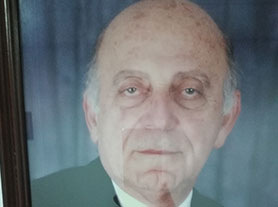
Hicham Al-Shaar
Hicham Al-Shaar was born in Beirut on March 10, 1932. He received a degree in Lebanese and French law from Saint Joseph University in 1958. He practiced law in Sobhi Mahmassani’s office from 1958 to 1962. In 1962, he joined the ...
Read MoreHicham Al-Shaar was born in Beirut on March 10, 1932. He received a degree in Lebanese and French law from Saint Joseph University in 1958. He practiced law in Sobhi Mahmassani’s office from 1958 to 1962. In 1962, he joined the staff of the judiciary, and was appointed as an advocate-general with the Public Prosecution in Mount Lebanon. He was appointed as an investigating judge in Mount Lebanon (1964-1971), then as a judge in the State Shura Council. He was appointed Director-General of the Ministry of Justice from 1973 to 1978. He occupied several leadership roles: he was appointed Head of the Central Inspection Agency in 1978, Director-General of the Internal Security Forces from 1982-1983, Director-General of the Prime Minister’s Office, and by virtue of his position, General Secretary of the Council of Ministers (by virtue of Decree No. 1319, dated 12/12/1983). Since 1992, he has been delegated by the Lebanese government to the National Council for Scientific Research and the Council for Liquidating Troubled Banks. He also held several other positions, including Acting Head of the Civil Service Council, and Deputy Governor of the Islamic Development Bank. He represented Lebanon in numerous Arab and international conferences. He is married to Ms Tamima al-Jisr, and has three children.
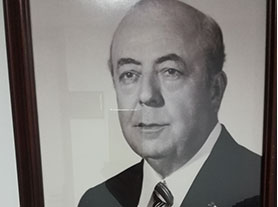
Hasan Kabalan
Hasan Kabalan was appointed a first-degree advocate-general, then a counsellor with the Court of Appeals in January 1939. On 9 January 1947 (Decree No. 7807/K) he was appointed as Head of the chamber of the Court of Appeals. He was appointed attending ...
Read MoreHasan Kabalan was appointed a first-degree advocate-general, then a counsellor with the Court of Appeals in January 1939. On 9 January 1947 (Decree No. 7807/K) he was appointed as Head of the chamber of the Court of Appeals. He was appointed attending member of the Council of the High Court, as a disciplinary council, in August 1947 and chairman of the chamber at the Court of Cassation, in August 1959. He was appointed Director-General of the Ministry of Justice, by virtue of Decree No. 2927, dated 16/12/1959, a position he held until 1970. In 1970, based on his request, he was assigned to the staff of the courts of justice (by virtue of Decree No. 14462, dated 15/5/1970). He taught at the university level as a Professor of Islamic and Social Sciences at the Institute of Oriental Literature. He was assigned to represent Lebanon at several international conferences, notably at the International Conference of Orientalists (England) in August 1954, and the International Conference of Social Sciences (France) in September 1954. Hassan Qabalan died in August 1973.
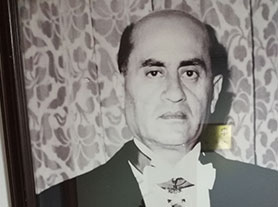
Shafik Hatim
He began his professional life in the judicial corps at the Beqaa Court of First Instance in the year (by virtue of the decree issued by Secretary of State Abdullah Bayhem No. 90 dated 23/11/1939. He was also appointed chairman ...
Read MoreHe began his professional life in the judicial corps at the Beqaa Court of First Instance in the year (by virtue of the decree issued by Secretary of State Abdullah Bayhem No. 90 dated 23/11/1939. He was also appointed chairman of the committee to liquidate rights acquired over the waters in certain villages and municipalities in the Beqaa in November 1939. In the same year, he became magistrate in Zahle. He later went on to become president of the North Lebanon Court of First Instance in February 1946. Advancing through several judicial posts, he was advocate-general outside Beirut, then became assistant to the Prosecutor-General at the Court of Appeal in 1946. Then he was appointed to the Council of Judicial Assistants for three consecutive terms from November 1947 to 1953, at the rank of general assistant at the Court of Appeal. In 1946, he was seconded to the amnesty committee as assistant to the Prosecutor-General at the Court of Appeal. He was appointed assistant to the head of the Cases and Legislation Division at the Ministry of Justice in 1948, and contributed in this capacity to extracting a set of laws that the Ministry of Justice was collecting, organising and publishing in a new form. In recognition of this labor, he was awarded the Silver Order of Merit. In May 1950, he was named president of the Appeals Chamber and magistrate attached to the Ministry of Justice. He was temporarily seconded to act as Director-General of Justice on 16/9/1952, by virtue of Decree No. 9441. He became president of the Cases and Legislation Authority in April 1953 at the rank of counsellor at the Court of Cassation. He was a member of the Beirut Water Department in October 1956. He later joined the administrative judiciary and held the post of counsellor in the State Council, and then moved to the judicial courts to be appointed counsellor at the Court of Cassation in September 1962. He was appointed member of the Justice Council two times, the first in March 1965 and the second in September 1966. He was appointed president of the court for organising family endowmnets in 1969.
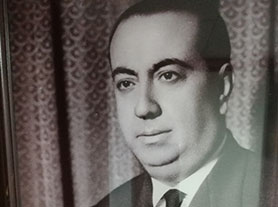
Anis Saleh
Anis Saleh joined the Lebanese judiciary in 1928, when he was appointed an investigator at Hasbaya’s court of first instance. In June 1929, he transferred to the Tripoli court, and in 1931 he was appointed investigating judge. In April 1931, ...
Read MoreAnis Saleh joined the Lebanese judiciary in 1928, when he was appointed an investigator at Hasbaya’s court of first instance. In June 1929, he transferred to the Tripoli court, and in 1931 he was appointed investigating judge. In April 1931, he was appointed 2nd class judge in mixed chambers of the Beirut court. After this, he was appointed as a magistrate in Baabda (in October 1936), and then as a public attorney at the Court of Appeal. In 1936, he was appointed as a counsellor at the Court of Appeal (by virtue of Decree No. 1117/K, dated 4/11/1936). He was delegated to carry out the role of Associate Inspector for the Public Judiciary for three years (by virtue of Decree No. 6/E, dated 1/2/1936. On April 6, 1944 (by virtue of Decree No. 1490/K), he was transferred to the Ministry of Justice, as the Head of Judicial Affairs and Legislation, and appointed a member of the committee to “prepare draft regulations for all government departments of the Republic of Lebanon, and determine the powers of Directors-General.” In 1946, he was appointed Director-General of Justice (by virtue of Decree No. 7060/K, dated 8 October 1946). In 1949, he was appointed Chairman of the Disciplinary Council for Staff of Administrative Departments (by virtue of Decree No. 14292/K, dated 7/2/1949). In September 1950, he was appointed Acting Director-General of the Ministry of the Interior (pursuant to Decree No. 988, dated 25/2/1950). However, he resigned from this position on April 17, 1951. By virtue of Decree No. 4107, dated 23/4/1951, he was assigned as Special Advisor to the President of the Republic for Legislative and Judicial Affairs. During his career, he was appointed to numerous committees that worked on preparing legal texts. He was a member of the Committee to Develop the Draft Notary Law (April 1935), and the Committee to Develop a General Accounting Law (August 1948). He was the Chairman of the Committee on Objections to the Electoral Process in Mount Lebanon (May 1947) and was appointed as a member of the State Security Council (June 1951). On 16 October 1952, he was granted his retirement request. He received numerous awards and honours, including: a Silver Order of Merit with Palms (August 1938), a Golden Order of Merit (June 1947), the National Order of the Cedar with the rank of Officer (June 1948), and the National Order of the Cedar with the rank of Commander (September 1950).
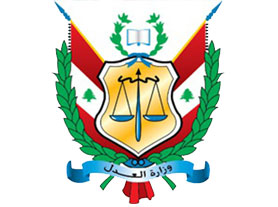
Simon Choukri
Born in Deir al-Qamar, Simon Choukri received his education at the Antoura School, and his degree in law at Saint Joseph University. In 1923, he began his career as Registrar to the Secretary of the Chamber of Deputies. In January 1938, ...
Read MoreBorn in Deir al-Qamar, Simon Choukri received his education at the Antoura School, and his degree in law at Saint Joseph University. In 1923, he began his career as Registrar to the Secretary of the Chamber of Deputies. In January 1938, he was appointed to the Magistrate’s Court in Beirut. He was appointed as General Inspector of circuit courts in early 1939. In February 1939, he was delegated by the judiciary to carry out the role of Associate Chairman of the Secretary of State’s Chamber (by virtue of Decree No. 105/E). In October 1939, Simon Choukri was put at the disposition of the Director of Justice, by virtue of Decree No. 1/EB. On 22 November 1939 (Decree No. 76/LE), after the Directorate of Justice was abolished and its departments were transferred to the Directorate of Interior, he was assigned to manage the administrative justice department. On 18 December 1941 he was appointed Head of the Prime Minister’s Chamber and Secretary for the Council of Ministers (Decree No. 30 / NI). He subsequently was transferred to the Directorate of the Interior as its Managing Director, on September 2, 1942. He became Head of the political department in the Ministry of Foreign Affairs on November 18, 1946. Finally, in 1949, he was transferred to the Ministry of Foreign Affairs, and put at the disposition of the Prime Minister’s Office (Decree No. 15285/K.). Simon Choukri died in 1953, and as a tribute the state honoured him with a Golden Order of Merit (by virtue of Decree No. 451/ML, dated July 21, 1953).
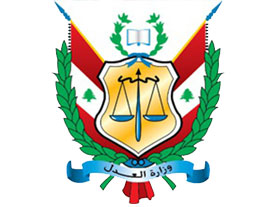
Sami Khouri
Sami KhourI was born in Rechmaya in the Aley District on 25 August 1896. He received a basic education at the Jesuit Fathers’ School. He then studied law at their university and received his degree there. In 1920, he was appointed as ...
Read MoreSami KhourI was born in Rechmaya in the Aley District on 25 August 1896. He received a basic education at the Jesuit Fathers’ School. He then studied law at their university and received his degree there. In 1920, he was appointed as a translator for the Public Prosecution at the Court of Cassation, and in 1921 he became an attending member of Beirut’s Court of First Instance. In May 1926, he was promoted to the rank of Director-General of Justice, a position he held until 1938. On May 9, 1938, High Commissioner Henri Ponsot issued Decree No. 56 L.R., which gave the Council of Directors-General ministerial powers in the “government of directors”, headed by Charles Debbas. He was then given the powers of a Minister and appointed Director of Justice in the government of directors, which was headed by Abdullah Behm. In 1942, he was appointed as Head of the State Shura Council (by virtue of Decree No. 1192/NI, dated 25/9/1942). Sami Khoury was the first person to assume the Head of Directorate General of the Ministry of Foreign Affairs and Expatriates, in 1943 (by virtue of Decree No. 163/K, dated 4/12/1943). He was then appointed as Lebanon’s Delegated Minister in Egypt and Ethiopia, and then Delegate Minister in Belgium, and finally in the Netherlands and Luxembourg. From 1955 to 1960 he served as the Lebanese Ambassador in Spain. He was awarded several medals, notably from Lebanon, Ethiopia, Egypt, Jordan, Albania, the Netherlands, Luxembourg, and Spain. He married Ms Evelyn Katebini with whom he had three children: Samir, Rafiq, and Mounir. Sami Khoury died on 11 May 1957.
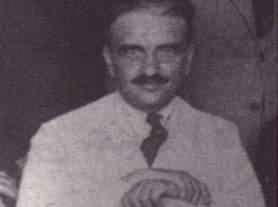
Charles Debbas
Charles Debbas was the first person in Lebanon to hold the position of Minister of Justice. He was born in Damascus on 16 April 1884. He studied at Thathalat Aqmar School, then in Saint Joseph University and the American University. ...
Read MoreCharles Debbas was the first person in Lebanon to hold the position of Minister of Justice. He was born in Damascus on 16 April 1884. He studied at Thathalat Aqmar School, then in Saint Joseph University and the American University. He studied law at the University of Montpellier, where he earned his diploma, and then his doctoral degree. He worked as a lawyer in Cairo, Paris, Astana, and Beirut. He also worked in journalism. He became the editor of the French-language newspaper La Liberté, and founded the French-language newspaper La Déclaration. During the French Mandate period, High Commissioner General Gouraud appointed him as the Head of the Department of Justice, Property, and Endowments in the Lebanese administration, according to Decree 343 dated 1/9/1920. He was then appointed Director of the Justice Department for the second time on 23/5/1922 by an administrative order issued by Trabaud, the Governor of Greater Lebanon. In December 1925, the High Commission selected him, along with Legal Advisor Souchier, to support the work of the parliamentary committee charged with drafting the Lebanese constitution. Charles Debbas remained Director of the Department of Justice until May 1926. As such, he was responsible for organizing the courts and the Bar Association. He also introduced the baccalaureate into the education system. He was elected President of the Lebanese Republic by the Representative Council and the Senate in a joint parliamentary session on 26 May 1926. He was in office for more than 7 years (1926-1933). He died as a bachelor in Paris on 22 August 1935.


SELECT INTEREST
Newsletter
ANNOUNCEMENTS
PUBLICATIONS


